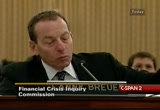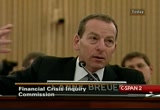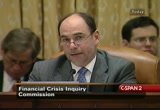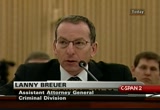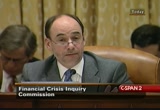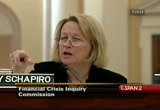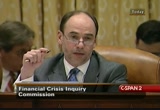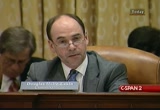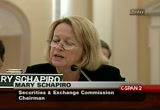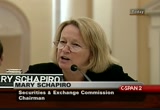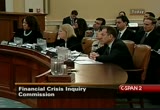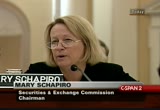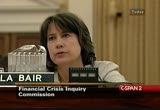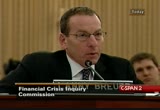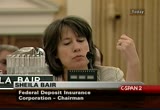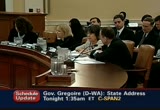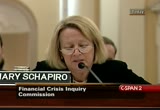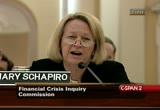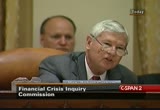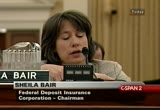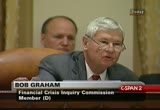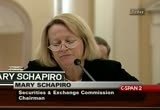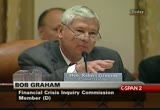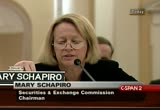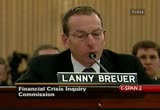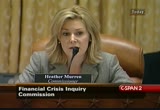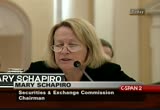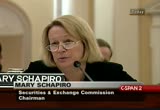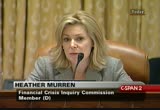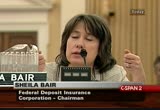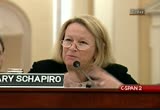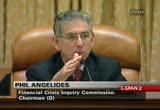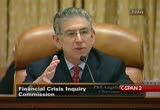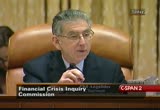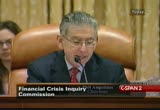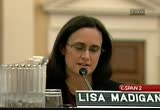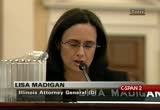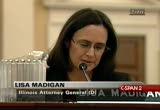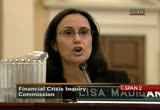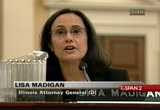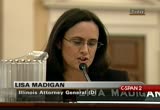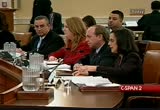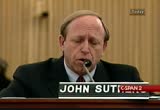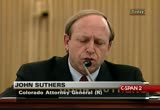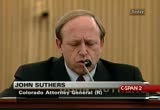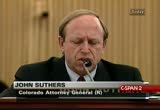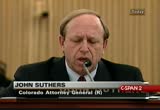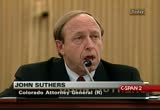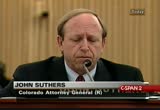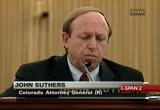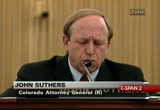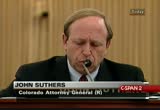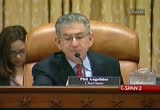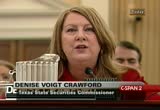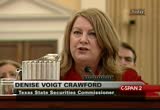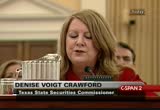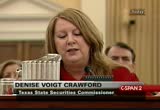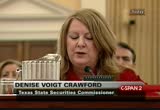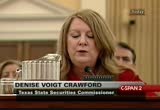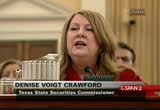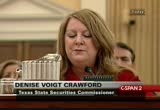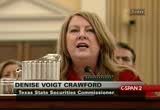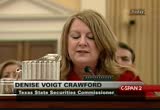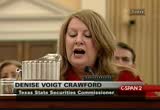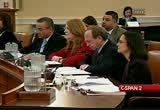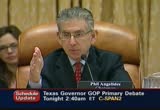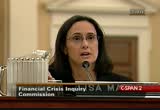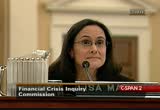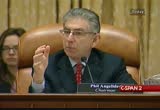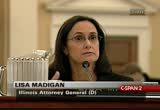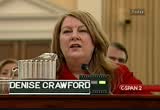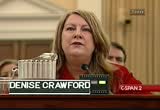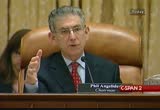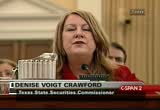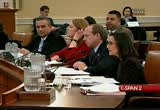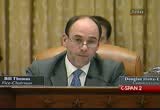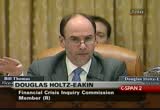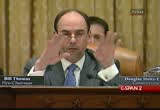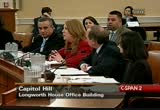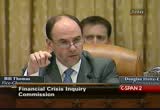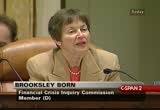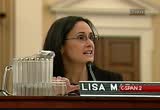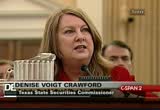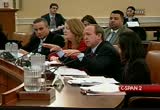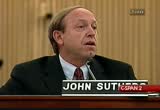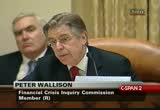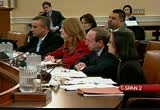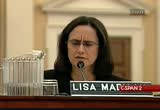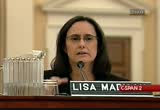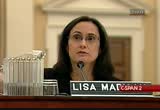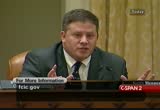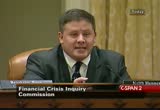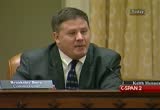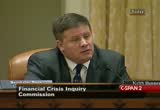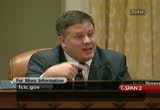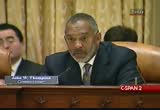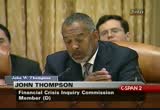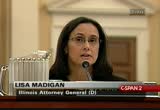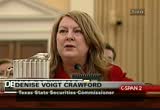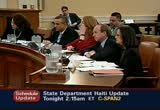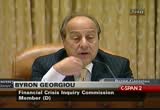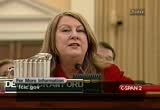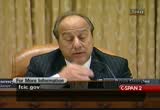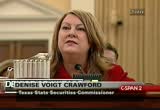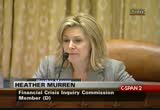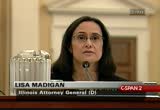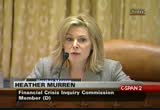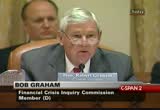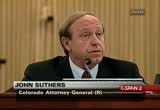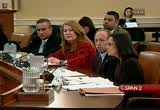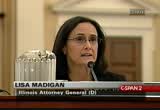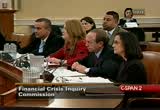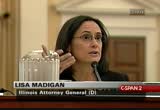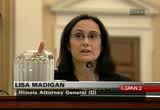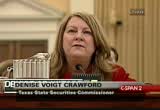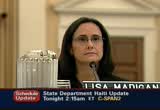tv Capital News Today CSPAN January 14, 2010 11:00pm-2:00am EST
11:00 pm
11:01 pm
to those who purchase the securitizations and what did they say about the underlying conduct. whether securitizations or others of agents and others who have reported that the absence they had were backed by perhaps stew loans considered to be of the higher grade when in reality they were supported by much riskier investments, mortgage-backed securities. finally if we go further to the very end of the continuum we looked at the institution the required securitizations to see what did they say to the investment in the public about what they had come so of course as the two chairs of course have said there were incentives at every step that appears for some and profiting not to be candid about what they had and we are looking at all of those and candidly have been looking at that for awhile and locate that right now in a very-- manner. >> the statute that this commission--
11:02 pm
>> mr. georgiou we are out of time. real quickly. >> the statute that this commission was created under provided the financial fraud and enforcement act and provided additional resources to each and every one of your agencies for the purpose it seems to me of investigating this particular area of fraud and i appreciate it. >> we have to move. thank you. >> thank you mr. chairman. of assume mortgage fraud is a tragedy for those involved that are harm by it but from the perspective of our job in determining the source of this enormous financial crisis its magnitude is what a central so my question to you is do you or any of your affiliate's on this task force have brought commination wide estimates of a fraction of mortgages either by number or value that are tainted by fraud versus simply performing poorly from an economic point of view? >> what i can say to you
11:03 pm
commissioner is i can't give you an overall estimate. what i can tell you though is that we have enormous number of cases. of course the fbi itself is headed now for a number of years, regional task forces, mortgage fraud task forces in this the attorney general himself said right now there are 2800 active investigations around the united states on the federal level just of mortgage fraud. obviously we see a snapshot. we see that the point we have investigation going. last year there was some are in the range of 65 to 70,000 sars suspicious activity and of and that is the very beginning of the investigation. so it is obviously widespread and all we can do, what we do is we perceive it throughout the country, we pursue either
11:04 pm
criminally or if they are not criminal cases pursue them civilly as well. >> for purposes of this investigation it would be useful to know things like of those on many turned in prosecutions of those prosecutions, how many mortgages are involved. by region we know what the origination look like. if you could share with this information you have available so the magnitude of the problem is documented. that would be very useful. >> i look forward to that. with respect to the other members of the panel, this is the happiest day of my life and i want to thank you for resolving forever whether short sellers run the world, and how much more to market accounting matters. i have been waiting for this day and look forward to your report. it is going to be wonderful. there is still a few mysteries left though. i want to go back to this issue
11:05 pm
of the rising leverage of the big investment banks and the role of the supervisory regime. i didn't quite understand the answer so i am going to say something and i want you to tell me whether i'm roggen of. the investment bank said no regulatory capital requirements. rung. and this, the 2004 decision thus relaxed, which lacks the regulatory process? >> the broker-dealers have always been subject to capital requirements, it dearly for conservative capital requirements. >> which were then relaxed? >> the bank broker-dealer polling companies were not subject to capital requirements or any regulation prior to 2004. in 2004 the into the program was created to bring those holding companies under supervision and at the same time, they were, at the broker-dealer level allowed to take a a different approach
11:06 pm
to calculating that capital that allowed them to use risk models that are strictly must take a 1% haircut for short-term treasury bond. you must take a 50% here can't-- they said there were lse use the models under bustle. the result of that was that smaller amounts of capital were able to support larger positions. >> i just did not follow that. so, in looking back at the crisis, and i am about to do something which i hate it when i was on that side of the witness table. which is you know only the sec congratulations i am going to blame you for everything that happened years ago. but, if you look back at the key that is in the crisis, bear stearns, of lehman, the fallout thereafter the sec is essentially missing in action. and publicly silent.
11:07 pm
and so my question to you is, given that it is now quite apparent that an enormous component of this crisis is the ability to assess counterparty, that is central to that is often asserted lehman's interconnectedness and pervasive impact when it failed. why is the provincial regulator, was the sec unable to say publicly something about the genuine financial condition of these large investment banks at the center of this crisis? >> it is a hard question for me to into because i wasn't there and i don't know the decisions that were made by my predecessor about what to speak to and what not to speak to. it is my belief, having looked carefully at the programs that existed at the time and consolidate of consumer into the program was disbanded by my predecessor in the fall of last year, of 2008, that the agency
11:08 pm
never made a full commitment to what was a voluntary program and i think that is one of the flows of the program. the five entities that chose to be regulators sst firms could have chosen to do other things and be regulated elsewhere and not subject to the sec. that is a bad idea under almost any circumstances but secondarily i don't think their resources were ever committed either technologically or human resources to become the kind of consolidated unsupervised that was really called for under these circumstances. i can understand very clearly how the changes on the capital rules impacted things and we can fix those. we don't regulate on a consolidated basis in a holding company said the longer. i can provide resources and we can support the program and rewrite the rules but i can't really address for you all of the failures of the program
11:09 pm
historically. >> and so, it does seem fair in retrospect there was an inadequate effort to assess the risks within these institutions? >> i think there was reliance on models which turned out to be quite flawed in many ways, some internal models relied on recent historical observation periods that turned out to be pretty irrelevant when we got into the financial crisis. i don't think the v-8 measures captured all the risks that were appropriate to be captured. i think there was not sufficient pressure on the firms to do really robust economic stress testing of their models on their this order of you know low probability, high stress scenario. i think there was a fundamental misunderstanding which was shared by many many regulators that secure funding would always be available and it wasn't at the end of the day forebearer renfer lehman. funding was an impossibility. i don't think anybody in fish and even in the back up
11:10 pm
liquidity pools that were required under the cse program was not envisioned that secure funding would ever drive up completely. all of these things i think came together to render this program at this time in effectual. >> was the sec's mandate simply too broad for it to be in particular functions? >> i don't think so. i mean i think, but i would say-- >> excuse me ms. schapiro the gentleman should use an additional two minutes so he can continue to pursue this line. i think it is very useful. >> berry fests and i will do the same. >> dscc has very successfully for many years successfully regulated broker-dealers and broker-dealer broker-dealer that customer protections are designed to protect the assets of the customers of the broker-dealer and that worked extremely well for many years.
11:11 pm
i think it was a geometric difference in supervision and regulation to go from broker-dealer regulation to the regulation of heretofore unsupervised, holding company said multiple affiliate's and i think that is not something you do overnight. i think it is a program youthbuild overtime and bring in tremendous resources and expertise. dscc did not have the budget to do that. dscc today is smaller than it was in 2005 and the agency did not have at that time in my view is sufficient resource commitment to this kind of their regulatory program. >> last question for both the do you and chair bair. we heard testimony from a gentleman named kyle bass who did extensive work identifying the fundamental weaknesses and securitized assets based on sub-prime mortgages. he took that the evidence of the danger it presented to bear stearns and was told it was
11:12 pm
rejected. he took it to the federal reserve board and it was rejected. did he bring that evidence to epd sec which would have had a clear provincial interest door to the fdic in giffi didn't bring it directly were you aware of this research? >> i am not aware of that and i would be happy to find out and provide that information. >> now i am not aware of that though 6 cents bear stearns is not a sufficient suppository institution i would not be aware of it. >> senator graham. >> thank you mr. chairman. earlier today i was on the c-span call-in program, and several of the callers raised the issue of the degree to which this crisis was a function of
11:13 pm
over governmental regulation and intervention, using as the primary example the community reinvestment act. mr. bair, have you any opinion as to whether excessive government involvement or regulation has contributed this and if so in what men are? >> well senator from the perspective of the department of justice, we really do defer to chair bair in chair schapiro and other regulators about the regulations and what needs to be-- i mean our review remains that we continue to look throughout it comprehensive approach with respect to suspected criminality and where the criminality is we are pursuing it. i just dumping given the perspectively can apply the level of regulation one way or the other but we are looking very hard, regardless of the
11:14 pm
eighth level of regulation were people made false statements are active in a criminal matter we are going to hold them accountable. >> let me ask the same questions of ms. bair and ms. schapiro. >> we have looked at searay postural in this as of other banking regulators and i think we have all concluded it was not a significant factor. the lion's share of these high risk loans remain outside of the insured depository institution so i know in terms of driving this know we have not found evidence of that. >> we don't have responsibility for the administration of the cr aso i don't have it you about that. >> were there any other areas of government action or regulation that you have found to have contributed to the crisis? >> i think as i mentioned in my
11:15 pm
testimony, i think that needs to be looked at. i think the gses also invested in a lot of private-label mortgage-backed securities which has been a big loss for them now, and so i think that is something you know i think there are pros and cons of having these types of entities but i do think that yet is an area of significant government involvement that i do think played a role here. >> i would agree with that. it is incumbent upon us to look carefully at that the role of the tse's and to define a more effective role going forward. >> ms. schapiro, you commented earlier about the fact that the rating agencies were not subject to private litigation, it sent to that degree worth less accountable. back in 1995, congress passed
11:16 pm
some legislation called private securities litigation reform act, which had the effect of making it more difficult for private investors to use the judicial system to hold the alleged defrauding entities to account. what effect do you think that legislation has had in the degree of fraud that we are now experiencing? >> that is a really xing-- excellent question and i guess i would like to give it more thought and provide you an answer in writing. there is certainly data available. stanford university runs a center that tracks all of the litigation and does an analysis of that and i guess i would like to take a look that in some other information before giving you a clear answer. i do believe that holding parties accountable is a critical component of effective regulation and effective discipline on their financial
11:17 pm
system. what i can tell you is the extent to which that law in particular may have lessened the discipline that would be helpful here. >> thank you, and in your written response it you could broaden its to include any recommendations that he might have as to the role of private litigation as enforcer of the fraudulent behavior within the financial arena. >> i would be happy to end as a general rule i think that you certainly my view and i think the view of the commission historically has been the private rights of action are very very important adjunct to our civil enforcement and the justice department's criminal enforcement capabilities and it instills an important discipline in the marketplace. >> thank you. ms. bair you have commented about the issue of compensation in setting some standards. i have been concerned that
11:18 pm
yesterday what we heard from the representatives of the major financial institutions seem to be that all of the performance that was intended to be induced by different compensation packages was essentially internal to the financial institution, enhancing its prop with the ability-- profitability as you are developing compensation proposals. do you think there are some external factors that should also be included in the performance evaluation of the executives and other officers of a financial institution, as an example? the fundamental purpose of the financial institution is to be an intermediary and allocate resources in a way that the dance is the overall economic well-being of society. it is that a consideration that
11:19 pm
should be a part of the performance evaluation of the executives of a financial institution? >> well, i think your answer depends on whether i was speaking as a board member this or a government regulator. as a government regulator warmists more specifically we will be looking at structures that we think create incentives for risky behavior that could put the institution and cost us money. that is our statutory authority. i will say that i think more generally boards and shareholders that they represent need to step up to the plate and then no under chairman ship para's leadership there of an effort to empower boards and shareholders to deal with this but certainly from the perspective i would assume they would want to look at what kind of corporate citizens and leadership is being provided.
11:20 pm
>> ms. schapiro, you have talked about regulatory change. the sec has been a particular targets for that regulatory change in the middle of the presidential campaign in the fall of 2008. senator mccain called for the firing of the chairman of the sec. i think it was the only financial regulator who was specifically called out to be terminated. are there any particular year structural issues within the sec that deserve specific attention as part of the general consideration of regulatory change within the financial agencies'? >> that is a very good question. i have spent my nearly one year at the sec of really trying to take apart the agency and understand where our strengths
11:21 pm
and weaknesses lay. and then, take action to try to bolster our programs wherever we can so we have created for example this new division of risk strategy and financial in addition to help us identify risks as they start to build in the markets that we regulate. we have brought in new leadership across the board. we have sought to very different in new skills sets for the sec in order to bolsterer capability and we made some structural changes. i don't think there's anything peculiar to our structure that leaves us more politically vulnerable in i served as the sec commissioner 20 years ago and i have the same feeling than that it is actually quite an independent agency that's seek to do what it believes is right in every instance. that said come of the one area where we have less independents than our fellow financial regulators with the exception of the cftc is that were subject to
11:22 pm
an appropriations process in congress and through the president's budget, while the other financial regulators are self funded. >> okay. you can have two more minutes. >> thank you. i am going to ask a question but i will first to clear a potential conflict of interest. i am one of the public members on the american institute of certified public accountants. the word accounts and has come up a few times. is there any suggestions to that specific profession that you would make as to how they could play a more effective role in suppressing fraud or other steps that would attend to mitigate the process-- prospects of another crisis as we are currently experiencing? >> i think it is critically important part of this was a
11:23 pm
debate in the regulatory reform context, that we continue to have the independents standard setters for our accounting standards going forward and that those standards are focused on what the purpose of accounting standards is which is to provide investors with all the information they need in an unvarnished honest and direct way to make rational capital allocation decisions, and so i think it is particularly important in this profession to continue to remember that the investor is their audience at the end of the day and that they establish accounting standards that further the interests of investors in full disclosure. >> i would just say that i think one area where accountants continue to have robust dialogue is on the issue of provisioning against rejective loan losses. i think all of the bank regulators agreed that current rules are too restrictive that basically there has to be an
11:24 pm
offense making a loss as the mendable and that perhaps least two banks began to reserve going into this so we continue to have a constructive dialogue with accountants about increasing the flexibility for banks to have more flexibility to reserve against loan losses. >> i was just going to add in the extreme with the department of justice are extremely interested in the role of the gatekeepers with your employer, an accountant or anyone else then you were involved in fraud. we are going to fdu aggressively obviously if you are a part of fraud we encourage people to come in before we come knocking on your door. >> ms. murren. >> thank you mr. chairman and i am at the risk of making your day a little bit less happy commissioner i'm going to go back to short selling. sorry about this. i do want to talk a little bit about transparence because there's an awful lot of requirements to their for
11:25 pm
filings are disclosure that relate to la positions in particular ownership by mutual funds or the positions that investment analyst may have themselves or market commentators and those types of disclosure requirements are not necessarily required on the short side and without a doubt short-selling is an important part of an efficient market but i do think it is worth noting that observers within the real economy and perhaps on main street have observed that the lack of requirements for transparency in disclosure on the short side may have exacerbated the financial crisis during its course, in particular because if you look at some public companies for example who depend on investor confidence to access the capital markets that that time i'd been renegotiate credit lines as many companies weren't you have to stop this down 90, 50% there is a significant amount of confidence that is lost and an inability to tap the capital markets to say nothing of employees to watch
11:26 pm
stock prices declined precipitously and obviously are frightened and there are morale problems that are real and companies that are part of the real economy not necessarily part of the financial institutions. could you please, whether you think there should be more transparency in this area? >> as a general matter i am a huge fan of transparency across the board because i think when people understand what all the issues are and what are the positions are, that we all are able to have market discipline in a way we don't when the markets are opaque. i would say a new short selling recording requirements were put in place this fall and i would be happy to provide you for the record a full description of those and what else were contemplating in the short sale area. vezina we have a number of proposals up for comment. there is tremendous and-- cantor is whether the uptick rule or a circuit breaker mechanism to stop the decline as the result of short-selling as opposed to
11:27 pm
law and selling of the stock after it is declined by 10% within a single day and the commission will be taking those up pretty soon. >> do you feel that each of you have enough authority to be able to take a look at things that would be considered manipulative in that market? >> it is extremely difficult. the amount of data to sift through in these cases is overwhelming. for arrested is an issue of being able to acquire or build the technology to do this kind of data analysis more efficiently than we do it now, so when we were discussing-- discussing earlier a potential sword sale manipulation, we have do we feel that millions and millions of orders to try to reconstruct what has happened, and it is my hope that the agency will have sufficient resources to do a better job with technology. i don't mean to make a pitch but
11:28 pm
our technology budget to is 50% for new developments, is 50% below what it was just five years ago so it is it really-- real incumbent upon us to have that capability. >> a separate question on the shadow banking industry. comment on what you think the contribution might it then from the shuttle banks to the financial crisis and its magnitude and perhaps what different authorities are regulatory environment you think might have prevented some of the exacerbation of what we saw? >> well, i think the poorly written loans, the payment shock loans that absolutely originated outside of the regional banking sector i thank as market share kept being pulled away from depository institutions created negative the and that is not to
11:29 pm
say it all banks were perfect so what was going on there as well but i do think a lion's share of it occurred in the non-bank sector but it clearly put the competitive pressures on banks and back to my point earlier about consumer protections i think nipping this in the bud in 2001 with strong consumer bulls across the board said simply you up to document customers and come to make sure they can repay the loan. you have to make sure the income is sufficient to repay the loan when the interest rate resets, simple rules like that we have never high cost loans i think in respect-- retrospective 2020 hindsight but it did a lot to stop this. >> i think, to some extent it depends on how you define the shadow banking system so i would agree with everything that chairman bair says said and i would just reiterate my concern about the otc derivatives
11:30 pm
markets, the role that they were playing a sort of shadow markets to be regulated securities options and futures markets and the ability to do in those markets what is clearly not permissible in the regulated market sort least as invisible in those markets, even if that is not permissible. >> would it be possible to get a summary of what you believe the institutions the other part of the shadow banking system and also the ones that may be outside of your jurisdiction? >> sure. there are questions for example our money-market funds part of the shadow banking system? they are highly regulated entities but they are not part of banks although they are important parts of the financial system so we could certainly try to divide the world up. thanks. >> thank you. >> do you have time? thank you very much.
11:31 pm
11:33 pm
>> will now go to the second session of our hearing today. i want to rock on the individuals who have come here from around the country to talk to us about the investigations and actions taken around this country with respect to the financial crisis. as had been our custom as i announce that every session we will be swearing all witnesses that come before us. consistent with that of would like all of you to please stand.
11:34 pm
do solemnly swear or affirm under penalty of perjury the testimony you're about to provide the commission will be the truth, the whole truth, nothing but the truth to the best of your knowledge? thank you very much. let me an ounce commissionaires, you made a note days' notice mr. holt's eat-in is sitting to my right. there is not a coup. [laughter] mr. thomas literally had a prior commitment that goes back when year and he had already altered to be with us yesterday and today they he had to depart for the west coast so mr. holtz eakin will be 60 in the vice chair seat and working with me on the allocation time for commissioners. let me start this by reminding witnesses coming thank you for your written
11:35 pm
testimony. it was very well done and i appreciate the effort you have made. we will ask each of you to give a statement up too 10 minutes and we will go to commissioner questions. we will start today with the attorney general of illinois. lisa madigan so please begin your testimony. that would be terrific. >> thank you, mr. chairman chairman and members of the commission for inviting me to testify today. my testimony will focus on my office have pressed to combat predatory practices that granted in the mortgage lending industry over the last decade and at the root of the country's financial crisis. the state attorneys general to serve as first responders when problems emerged for consumers are routinely aware of the wide scale of 38 -- abuses of the vote of all mortgage lending market. many years before the housing bubble burst.
11:36 pm
my testimony will address what i see as a failure of regulatory oversight and indeed for a robust state enforcement regime to protect consumers in the future. i serve as the illinois attorney general seven years and from day one i have focused on protecting homeowners and borrowers from unfair and deceptive practices. since the late 1990's illinois in conjunction with other states investigating some of the largest subprime lenders in the country. household finance, of their quest, countrywide and balls fargo. and after undocumented the practices we sue them for putting kilometers into risky loans they could not understand or ford or get out of. the investigation of the lenders and show the pattern of predatory lending that
11:37 pm
would kirby and destroyed much of the mortgage industry and our economy with it. of predatory practice is a word driven largely by the securitization process which allowed london -- lenders to bundle and sell home loans and shed liability. once lenders were free from responsibility, common sense underwriting standards quickly deteriorated. mortgage lending was turned on its head. lenders made more money selling high cost risky loans they and the sound loans for the simple reason wall street paid more for subprime loans with risky features. we see in 1999 subprime loans were only 3.8% of the market and alt a loans only 1.7%. by 2005, at the height of the frenzy come almost 50% of loans originated were subprime or all day. two respond to wall street's
11:38 pm
growing demand lenders had compensation and the structures that compensated officers to add the risky features. in our investigations we examined rates sheets to determine compensation and what we found was alarming. vendors paid brokers and loan officers with low introductory teaser rates that were set up for payment shock and foreclosure when their rates reset. they also paid brokers to put them into low or no documentation loans that allows them to stage or in places far worse income without verification this type of underwriting permitted lenders to apply in subprime loans into without the ability to repay them. one reports coming by 2004 no doc loans and comprised 41% of the market.
11:39 pm
there also paid more for putting will pondered-- to wanders into one hedge% of the value levying with no equity. the percentage of non prime loans with 100% increase dramatically between 2000 and 2006. additional new mentors paid more for other risky features such as higher interest rates come up payment options that did not even cover principal or the interest accrued come and prepayment penalties that trapped far worse than their loans for all of thursday features were common and what we reviewed in our investigation. in addition, we have talked to thousands of homeowners struggling to pay mortgages. the stories we have heard add to the picture of the lending industry predatory practices. time and again we hear from farmers who did not understand the terms of their loan. for example, menu bar were sought they're being sold alone with a fixed-rate loan is to be presented at
11:40 pm
closing with an adjustable rate. some did that even know the mortgages had the adjustable rate until two or three years later when the interest rates preset trigger borrowers have told us the most complex financial transactions ticked no more than 15 you're 20 minutes to complete. additionally based on a study of high-cost loans in chicago area, we have found the lending industry predatory practice is were often concentrated in the minority communities. i and other state attorneys general have been aggressively pursuing them for over a decade and continue in the aftermath of the crisis. there is a parallel story. one that is equally critical to a full understanding of this crisis. in the years preceding federal regulators showed no interest in showing their
11:41 pm
authority or hampered state authority. the federal reserve have the authority to tighten underwriting standards for all products and lenders but it chose not to exercise that authority until after the market collapse. in 2006 the federal regulators had pressed for underwriting by splitting out guidance but the bulk of the damage had already been done for crow even as the fed did little to protect consumers from the effective proletariat lent these lending the occ actively engaged in a campaign to avert the coming crisis. this culminated with the occ is schuman's in 2000 for a sweeping preemption rules that would over tune -- overturned the principle that federally chartered banks are subject to state law. in the wake of the federal regulators push, and many of the largest mortgage lenders sought shed state licenses
11:42 pm
and sought shelter behind a national charter. it is no coincidence the era of expanded preemption gave rise to the worst lending abuses in the nation's history. a major lesson to be drawn is federal charters must not be mistakenly used to have paid blanket exemption from prosecution for violation of consumer protection laws. in conclusion lessons to be learned are preserved underwriting standards which violate the borrower's ability to repay the loan and not compensate more and with three -- bourse the features. there are signs there were some lessons to be learned. last year the fed put him place strict underwriting standards for higher cost loans but unfortunately while they would apply to subprime and otia will not
11:43 pm
apply to prime products including the most complicated products we have seen and what will constitute the next wave of foreclosures but i believe common sense dictates we need a strong federal underwriting standards that apply to all home loans prejudicial and the fed has proposed with riskier loans i with 17 other drafted and submitted comments the drafting the reserve for bad. this crisis resulted from a combined value of the financial institutions and the regulatory system in the resolution on the vividness of every participant with state public and private to commit to common sense reforms the state attorneys general and the ability to investigate fraud in mortgage lending must be vigorously preserved. the strong record in
11:44 pm
responding to consumers make us a necessary part of any future solution. thank you would be happy to answer any questions that you have a. >> thank you very much and his attorney general. attorney general to 15 from colorado? >> i appreciate the opportunity to appear before you today to describe the activities from my office in the midst of and in response to the country's financial crisis. i have the privilege to serve as the attorney general since 2005 they came into office just as we were starting to hear about grumblings and tell the housing market in my view which is largely hindsight the states were not well equipped with legal tools to do with much of what has transpired until the ensuing five years. , reuter have passed
11:45 pm
legislation in 2002 dealing with predatory loans. along with the equity protection act of 1994. unfortunately unlike the counterpart the limits on balloon payments and prepayment penalties on the negative amortization loans apply to such a small subset of the highest cost loans proved to be a little deterrent. pushing ever more exotic products with introductory rates those tipped their products beyond the coverage of such laws. colorado was only one of two states that did not regulate mortgage loan originators for awhile now have licensing of individual brokers we're one of the few states that does not regulate the mortgage lending activities of nine depository vendors.
11:46 pm
with respect to the laws we did have been placed in 2005, we were largely powerless to enforce those laws against national banks with the lending affiliate's due to the aggressive stance regulators took to pre-empt a lot even with respect to discriminatory lending and a deceptive advertising. i a encourage you to carefully examine the advisability of federal preemption in the financial industry regulation. reach 90 law-enforcement task force to coordinate with that, rather district attorney to ensure the laws were pursued by the most effective means. my office focused on enforcement efforts on deceptive advertising bread local loan originators and the egregious fraud with
11:47 pm
consumers. we examine the advertising of loan originators for federal truth in lending act violations. seized and desist letters went to those that were not disclosing the apr in the print advertising or who were disclosing the inaccurate a pr. by the 82006 newspapers were full of advertisements for loan originators who hawking payments they emphasize low teaser rates and failed to disclose negative amortization they would have if only making minimum payments. they were buying a fixed interest rate would only the first monthly payment was at the advertised rate. we issued subpoenas to all of the advertisers who conducted of the loan originators. they told us the teaser rates "made the phones light
11:48 pm
up under quote it was clear borrowers crowded gisele loans without knowing the true nature of the teaser rates the significant negative amateurs asian and the prepayment penalties that came with these loans. a number of these originators went out of business that primitive them several resumed-- refuse to settle an three suits for deceptive advertising. we also brought a series of that civil actions engaged in deceptive or fraudulent transactions against individuals engaged in real-estate schemes. we summarize these of the written testimony and in illinois and others staged actions we also pursuits local companies and the colorado. we aggressively pursue
11:49 pm
criminal cases and the fact we have sentences up at 30 years in mortgage fraud cases indicates how egregious judges felt this conduct was. turning to current trends over the past two years from office has seen a dramatic shift in consumer complaints. we're receiving fewer complaints about mortgage originators now have numerous complaints about mortgage servicing yen foreclosure scams. in addition to working with individual complaints my office is participating in the multistate effort to work to encourage a loan modifications and sustainable long-term solutions. this date foreclosure prevention group is comprised of 15 states attorney general and the state bank supervisors. this group of veteran down with representatives of the 20 largest loan servicers in
11:50 pm
the united states. since that time the working group has been collecting data from 13 of these companies in the effort to verify the foreclosure programs i indicate the majority of the seven who were not disclosing information are claiming federal pre-emption and no requirement to do so. the data collection effort led to the publication terrain in 2008 with the fourth report during 2009 to be replaced days reported shortly. each of the first three revealed a wide gulf between at serious to link with borrowers and loss mitigation efforts with eight out of 10 it seriously delinquent borrowers not and and the loss mitigation process. well those are believed to have improved over the last year there are far too many borrowers who are not aware of loss mitigation alternatives to foreclosure or are frustrated to work
11:51 pm
out a non foreclosures situation. foreclosure released scams are a significant problem for car shortly after i came into office i was approached by a local county officials called public trustees about a rapid increase in the number of individuals soliciting homeowners in foreclosure for a variety of services ranging from refinance and loan modification to investment schemes to allegedly save the home from foreclosure. a task force and in 2006 the task force was instrumental to drafting and securing package -- passage of our act for piper friends collecting up front these from taking a financial interest and property and of the contracts must contend language designed to protect consumers. investors or equity
11:52 pm
purchasers are subject to strict -- stricter written procedures and a three day cooling off point* brno documents can be recorded and also the sales back transactions would not surprisingly over last year's complaints have outstripped all others into my office. building kilometers are besieged with solicitations out the door in their mailbox over the telephone or on the internet. we have taken action against 33 foreclosure rescued and loan modification firms and investigations under way against other companies are aggressively advertising to homeowners they aren't many of the companies are located outside of colorado. 17 actions were announced as part of two separate sweeps july and november 2009 that
11:53 pm
25 state attorney general offices coordinated with the ftc. let me briefly touch on continuing concerns progress more colorado consumers have fallen behind we have seen the increase in the marketing nablus services to those same conservatives -- we've seen an increase in payday and other high-cost loans and an increase in the debt settlement as well. under colorado law payday loans are limited to finance charges and duration. and 2002 the total loan amount from payday lenders 245 point* 9 million. by 2007 that number had increased 160% at 639 point* 5 million. of these figures did not take into account unlicensed payday lenders operating on the internet and attempting to avoid state licensing.
11:54 pm
and debt management scams are problematic. since the uniformed debt management uniformed services act took effect my office has investigated and taken disciplinary action against 26 companies and has issued additional 22 orders with failure to make mandatory disclosures and charging excessive fees. they must refund more than one point* $3 million to colorado consumers and assess fines and penalties with $35,000. about but by saying we're seeing a lot of credit repair scams. i will conclude by suggesting that cause and effect of the current financial crisis per varied and complex. we in the states are dealing with the following days with a the fallout part of that means the facts of record haul of foreclosures spiraling credit cards and the significant growth of
11:55 pm
other less reputable industries to take advantage of the financial struggles of our good and honest citizens. thank you. >> ms. crawford? >> good morning mr. chairman and members of the commission. i and the president of the north american securities administration's tammet can you the in into that? >> and the taxes securities commissioner and president of the nasaa i am honored to be here today. it is instructive to examine the rate of the responses to the major scandals of the past decade. when exposing securities analyst conflict and mutual funds to the auction rate securities cases, state securities regulators have consistently been in the lead.
11:56 pm
indeed, in some cases the time the states began investigations it was unclear whether federal regulators intended to pursue any investigation at all. the most recent example is the option rate securities spread out billions of these dollars were sold to investors with major brokerage houses and did february 2000 market collapse. investors were left with illiquid securities. and june of that year regulators brought a similar action charging for the firm with false representation. a month later there was a suit against ubs and july a similar action was filed against merrill lynch and on august 7 nablus -- nasaa announced the first summit with citigroup and that led
11:57 pm
to an investigation under which the company would fully reimburse the 40,000 customers who were unable to sell their option rate securities and pay penalties of $100 million. significant they the fcc took no public action with respect to ars until 2008 when they announced a preliminary settlement with citigroup comparable to the agreements already reached with members of nasaa. suddenly state investigations into corporate abuses that officials had mr. resulted not in reporting at the federal level but putting criticism at the state. some agencies have responded by issuing all agencies for state law or bringing suit against state officials. they have found themselves engaged in the battle of federal agencies simply to obtain the authority of the interest of the investors.
11:58 pm
the national security markets improvement act of 1996 significantly impacted the role of state regulators. it pre-empted many state regulations and enforcement provisions and also prohibited the states from taking preventative action in areas that we now know have substantial career reading factors to the crisis. with the federal regulatory agencies have gaps in the entire investor protection regime. my written testimony provides examples with the regulation by the six offerings investigated by the texas state securities board. and the final analysis obstructing the state's ability to investigate known as securities-law violators when they become participants in subsequent offerings. by way of example another
11:59 pm
enforcement case in texas is worth mentioning. national life settlements recovered nearly $20 million or 69% of the amount they invested. most of the investments were retirement funds. it is rare to have such a large recovery in a securities case. and core of the receiver told the judge of texas state security board had acted before they had a single complaint. investigations like this are trademarks of security regulators. no the diss to small to release warrant a cursory review. it is to see similar the swift action on the part of the federal regulators. state security regulators and enforcement statistics showed effectiveness. 2004 to 2008 we conducted more than 11,000 enforcement actions.
12:00 am
which led it to over $230 million in penalties and more than 3.7 billion dollars returned to investors. we're also responsible, this is significant, a four -- for the defendants sentenced to more than 4,000 years in prison. 4,000. the cost of pre-emption at the expense of state jurisdiction in glenn theobald common sense only because it clearly demonstrates the security regulators in their structure actually work. . .
12:01 am
therefore is created a huge regulatory vacuum, which is highly significant because these deals are often billion-dollar deals that have an effect on our economy. today no one regulates the thought erring. nasaa says they should regulate the authority in all five or six offerings. since the repeal of the glass-steagall act with greenwich bliley with an excessive risk taking emerge within institutions with
12:02 am
federally insured deposits. which examined yesterday. key activities of investment banks are incompatible with the special your commercial banking. these include underwriting and dealing in securities derivatives of such securities, principal invested and managing in-house hedge funds. i believe that a non-bank financial intermediation industry would quickly emerge following glass-steagall type reregulation, but it would be one that was populated at transparent firms that won themselves to straightforward oversights by regulators in tandem with the systemic risk regulator. third, as evidenced by the inspector general's report on the made off affair and the testimony at chairman schapiro an fcc staff before congress, the bulk of federally covered investment advisors are examined in three family. a clear oversight gap has
12:03 am
existed for some time and is now emerging into public view. madigan members are fully prepared to fill this gap by excepting the possibility for investment vaporizers up to $100 million in assets under management. nasaa members position qualifications that ensure the permanent closure of this gap will be made or geographically near these folks is more economical and easier for us to go out and look at them. and this is the trench the industry is moving towards investment advisors and moving away from the broker-dealer business model. because a regulation is complex and substantively different from the regulation of broker-dealers come in the experience nasa members is all the more critical in this area. a fourth, individual behavior is not reliably rational during just those times when systemic sleep t. is in jeopardy.
12:04 am
nasaa believes the optimal communication in association with systemic risk mitigation could best be accomplished by establishing an independent systemic risk council. here both federal and state regulations need to be represented. and they need to undergo analysis, risk assessments, and recommendations. this would effectively establish a crisis management protocol with clear and regular lines of communication among all great leaders. the complexity among the financial markets has exceeded the company of the capacity regulators, providing evidence for the need for state banking insurance securities regulators on the systemic risk council. fifth, the current levels of funding for state and federal law enforcement agencies as well. increase in enforcement to effectively deter fraud is much more good than after-the-fact compensation of victims in
12:05 am
economic damage repair. in conclusion, the unique experience is a security regulators on the front lines of investor protection are provided the framework for my testimony. as the regulators closest to investors we provide an investment the layer of protection. as you continue to examine the causes of our current financial crisis and develop recommendations to prevent a recurrence, he respectfully suggest that you strongly consider the restoration of authority that was preempted over the last 14 years. our presence did not contribute to the crisis, rather the fact that our regulatory enforcement roles have been eroded with a significant fact you're in the severity of the financial meltdown. thank you very much. >> thank you for summing up. mr. theobald. >> good afternoon, mr. chairman and members of the commission. i want to thank you for the
12:06 am
opportunity to testify before today about the miami-dade police department for combating fraud. facing mortgage fraud investigations may mediate county mayor carlos alvarez established a mayor fraud task force in september 2007. this public-private partnership uses a comprehensive approach that blends legislative change, prevention, enforcement, regulation, and prosecution to reduce mortgage fraud and prevent victimization of individuals and businesses. according to vinson, it is one of the fastest-growing white-collar crimes in the united states. from 06007 florida held the dubious distinction of drinking first in the nation in mortgage fraud. according to the mortgage of the research institute also known as mara, miami-dade pizza stayton instance of mortgage fraud and ranks in the top five major metropolitan areas had by that time. the number of suspicious activity reports from financial detentions reported by vinson tripled from 04 when it was over
12:07 am
17,000 to over 64,000 in 2008 and is closing in on 70,000 in 2009. they estimate that all those foreclosures contain some type of mortgage fraud so seems clear that foreclosures in mortgage fraud are intertwined to some degree. in both 07 and 08 ordering section in the nixon was miami-dade again been the hardest hit area in the state. traditionally, the fbi and the hud inspector general's office and of mortgage fraud investigations. in many areas though the fbi special for handling these cases is that a certain dollar amounts and cases that fall below the special must be handled at the local level. the fbi miami office, for instance, had a one million-dollar threshold that close to 90% of all the cases did not beat. so compounding that problem, that was the fact that no state exact issued to suggest mortgage fraud is a crime and local law enforcement investigators and prosecutors did not have
12:08 am
sufficient knowledge, experience, or training and taking on mortgage fraud cases. in addition, the combination of questionable mortgage industry professionals, the lack of appropriate resources for state regulators to accomplish the legal mandates of their office and the relaxed lending institutions led to a rapid increase in mortgage fraud that has had a detrimental effect on miami-dade county, the state of florida, and the entire country. a response to miami-dade does local long form and have lacked the authority and ability in the tools to investigate and charge subjects of mortgage fraud, passed for starship and a for the first a statute which would allow local law enforcement officer to arrest perpetrators for the crime of mortgage fraud. this legislation formed the cornerstone of the task force. nevertheless, a multifaceted approach was necessary because the mortgage fraud crisis was not created by one or two different components gone round out an entire breakdown of the real estate industry.
12:09 am
to address the various strategies for reducing mortgage fraud, the miami-dade police department can alternate key stakeholders including elected officials, leaders of local government, business executives, law enforcement professionals, prosecutors, and we formed five committees. the first committee was the one person a committee that's responsible for detecting, investigating, apprehending and prosecuting mortgage by the jackson enterprises. the committee comprises largely investigators and supervisors in the miami-dade police department's economic crimes bureau detectives work with other local state and federal law and force meant to solve cases and african subjects. the state attorney general's office, the u.s. attorney office and the miami-dade office prosecute the cases and the respective courts. the legislative committee, which enhances current laws, creates new life, and ordinances, several accounts for his members are state legislators who have assisted in sponsoring a passing state laws to achieve the task force's goal. the regulatory committee, which enhances and enforces the
12:10 am
regulation on all parties involved in a mortgage transaction. the business partnership committee on the which creates and transmits effective business practices and an ethical code of conduct to enhance cooperation with law-enforcement and different professions involved in a mortgage to attack the problem and stop fraudulent loans from actually being written. and an education component, which helps law enforcement prosecutors and industry professionals build awareness about mortgage fraud through extensive community visibility and guest speaking events, news conferences for major sweeps, rest, and new legislation. today, mayor alvarez to have forces in the few public part of task force is that the county level in the entire united states and it has tremendous impact on the way mortgage fraud has been viewed in florida. the law-enforcement committee has shouldered a number and a lot of the burden in achieving this goal. to date there've been several thousand reports and inquiries and currently 682 investigations are disappeared the economic
12:11 am
crimes bureau has made more than 189 for mortgage fraud and charges which are present more than 60 million in losses. we've created a training manual entry more than 400 investigators and prosecutors in the state of florida. as far as legislation goes, legislative committee crafted the legislation and an enhanced the courage mortgage fraud statute which was sponsored by or supercompetitive carles low post and gwen margolis. these bills were signed into law by governor crist and affect it july 1st of 2000. they enhanced the law-enforcement ability to notify the county property appraiser's office when in effect this property has shown mortgage fraud and has pompano caused that it occurred and this is important because a property appraiser's office is now required to reevaluate not only the affected property but the properties run a particular home or that condominium. and this will reduce the taxes and has reduced the taxes of all the properties affected by the front yard not only the
12:12 am
individual property, but everyone involved in the scheme. the bill also created a second-degree felony for the mortgage fraud that occurs over $100,000. in 2008 at the federal level, house resolution 6053 the nationwide task force act of 2008 sponsored by congressman cantor's bake was passed in the house of representatives and it was cemented as a nationwide fraud coordinator of 2008. an importunate wintertime in the senate without again on january 14th 2009 h.r. 529 the nationwide mortgage broadcast at the 2009. the legislation sought to create a nationwide program modeled after miami-dade's mortgage fraud task force to address mortgage fraud in the united states. on may 20th 2009, president obama signed public law 111 -- 22, a sense of congress encouraging the creation of the nationwide mortgage broadcast for sac. the act, which was senate 896
12:13 am
was sponsored by congressman meek and senator bill nelson both of florida. as far as regulation goes, following the recognition of the regulatory committee the florida office of financial regulation department of business and professional regulation enacted regulations to expedite emergency hearing at this suspend the licenses of real estate agents and mortgage brokers involved in arrested for mortgage fraud or other related fraud. the immediate suspension will prevent the agent or broker from victimizing unsuspecting home purchasers. regulations also require back on track for licensure all runaway teenagers. additionally an overhaul of the state saturate for the mortgage industry was in this year's legislative package. the business partnership committee created real estate best practices manual to distribute to miami-dade county realtors. the committee also sought and received either funding from florida bankers and other professions involved in the mortgage business to assist in financing the cost involved in prosecuting mortgage fraud or
12:14 am
the education committee has created a public complaint form with website access to report mortgage fraud and it is on the mayor's website. there's also an established database of speakers available to appear at engagements to speak on behalf of the task force are additionally, an aggressive media campaign to educate the public has been undertaken. in conclusion, mr. chairman, the task force is committed to making a difference in the quality of life of the citizens of miami-dade county by reducing the number of incidents of mortgage fraud. although this is a terminus at large problem in the united states, the steps have been taken in miami-dade can be duplicated elsewhere in florida and throughout the country. the task force's comprehensive multidisciplinary approach that is proven to be successful in miami-dade county is being sought as a model for attacking mortgage fraud in the united states. the mortgage fraud task force in its account of schmidt can provide a solution to the national financial crisis. with the passports model, hard work and perseverance by dedicated public servants and industry professionals can unravel the mess that was
12:15 am
created by greedy lenders and fraudsters. i look for to working with you and other members of the committee on solving this serious veteran nations economy. thank you for allowing me to testify before you today to look for to take your questions. >> thank you very much. we'll start the questioning and i will lead off here. attorney general, madigan, want to talk about the deep systemic failures at the federal level. when they first visit this issue of the combined lack of federal import and coupled with efforts to preempt. tommy just a a little bit about fewer visits with them talking about the federal leaders. you've been on the scene for seven years. did you go to the federal reserve or the occ or the other federal regulators and tell them about what was happening. can you tell me what happened? >> sure, i've been sticking with people and this would've been 2005, 2006 if memory serves me
12:16 am
right about the problems we were seeing, particularly with subprime loans, particularly with low doc no doc loans. you know, these are very specialized objects that until this crisis really got underway were very rarely use. they were used for people in general who had good credit, but may not have been active stream of income. let's use the example of a medical student recently graduated, secure job, you know, wants to purchase a home, but doesn't have any income at that point. the reasonably you could look and see that that person well. you know, that was the intent of say a low doc, no doc loans. when you look at what happened in a lending industry, those types of loans became almost standardized. in large part because there was a lot of money to be made that
12:17 am
putting people in those phones because it would cost a little more to put somebody and not loans that there would be a greater revenue stream and therefore more interest in more ability to sell that off to wall street. and unfortunately, there was a lack of either appreciation nor interest in the problems that were occurring on the ground, not just in the state of illinois, but throughout this country with those types of risky loans. in addition, dashed >> can i ask you, did the state attorney general's visit with occ federal reserve and visit these issues? >> i think in 2005 you might be aware there was an action brought against at the time attorney general spit their by the occ attorney general spitzer had attempted to initiate a fair lending investigation of a number of national banks and the issue of preemption arose then.
12:18 am
going all the way up to the united states supreme court it was resolved earlier this year. so the occ was well aware and we did obviously make the occ aware that we were looking into not just their lending practices that other practices of the lenders in an effort to combat the erosion of underwriting standards. they just had a different agenda. >> let me ask you about this notion of a higher payments for riskier loans. that's because what mortgage brokers were being paid higher amounts to peddle these loans or was it that commissions were based on interest rate structures, which by their nature overtime were higher. what was it? tommy the correlation between whiskey lounge, higher payments were making those more attractive for wall street. i want to understand that as best i can. >> ultimately you are looking at
12:19 am
the income stream out of that loan. and so the higher the interest rate is the higher the income stream should be. fire those payments will be. and so, brokers as well as loan officers though in-house lenders as well as originators, as well as independent brokers who were selling bones or incentivized to put people into high-cost loans and then to complicate the problem at risk a features to the loan so that prepayment penalties, balloon payments, things of that nature that attract people, certainly with the payment penalties in ensuring an income stream -- >> the search actually did in the income streams? >> they would be. here is what you are concerned about. they were calculated into what the payment would be to the brooker or the loan officer and so that was the incentive that we have seen. as i said, we have seen the rate sheet so the amount that brokers
12:20 am
and loan officers were paid, based on the features of the loan, based on interest rates of those loans. >> you can provide those to us. >> it was part of our litigation with countrywide so i will see if we can. >> all right. ms. crawford, you have been in your job for 28 years of the texas securities regulator. what kind of grade would you give the federal regulators are the specifically, your greatest interaction with sec? what kind of grade would you give them for the last decade? >> i would have to give them a grade of approximately d. and the reason that the grade is d- is because there have been some actions on the part of the sec, but the problem is that they've missed the boat with regard to the most dramatic threats to the investing public. there seems to have been a lot of the dvd they are, but the
12:21 am
activity has not been focused in a meaningful way in addressing these problems as they were they to individual investors. and really, large investors as well. so there has been a lack of leadership. much has been said about the lack of resources, but the problem with that argument is that there are never enough resources. and what has to happen is that you have to have good people that will strategize to deploy the limited resources they have in the most effect of whey to protect investors. and that is the mission of the sec and is that the forefront of what they're supposed to be doing. we found on a number of occasions that they just weren't there. these major fraud that i mentioned before that turned out to be systemic and would have been exactly the kind of systemic national problem that
12:22 am
the securities and exchange commission would have been expect it to address, was not addressed. and therefore the state security regulators had to step up to the plate and fill that void. that is not the kind of thing that i want to be doing on a daily basis. >> was very collaborative -- has there been a collaborative relationship with the sec and you talk about limited resources. it would make sense organizational is the two lookout counterparts across the nation and on a regular basis talk about what they are seen in the field and in a sense coordinating enforcement. has there ever been that kind of relationship? >> mr. chairman, that kind of relationship does exist at the regional offices of the sec. the regional offices would give probably an a+ grade because they work very closely with their counterparts in the states. they were collaboratively with
12:23 am
state and federal prosecutors. it is really a beautiful business model for regulation. on the regional level at the sec. it is only in washington that we have had this problem. and it is not always been the case prior to about ten years ago, the sec was in our estimation the crown jewel of the federal agencies. they knew what they were doing. they knew what they were supposed to do. he knew how to work with all the other players to get the biggest bang for the buck. so it has been very disheartening for all of us from a state security and others to see this occurring. >> okay. mr. holt began. >> thank you and thank you for the witnesses for being with us today. and he began with a standard admiration that we thank you very much for your answers to the questions we get to ask now.
12:24 am
it would ask your cooperation as well and answer questions that we would submit and writing after this hearing and look forward to working with you. as a couple of questions that will reveal i know nothing about the kinds of things that you do. i guess the first one goes to you, attorney general madigan which is seems very come in sense to me someone would pay for a mortgage that's more valuable. so what is wrong with that? >> what is wrong with that is that the broker level they were no longer looking to determine as part of the underwriting practice whether or not the borrower could actually afford to pay the loan. >> so does not so much effect to pay more for a mortgage that gives you greater income streams. it's the underwriting standards again have deteriorated here at >> correct. there was an incentive to put people into higher cost of a riskier loans when they were not appropriate to be in those loans because they ultimately may not be able to pay them off.
12:25 am
and as we have seen, that was in fact the case. >> okay. and they guesses would be a general request to everyone. if you have information again on the pervasiveness of fraud in mortgage origination. i think this is central to the investigation, you know, what fraction of mortgages by value and number were affected by fraud over the period from say 2000 to the present. getting a sense of the magnitudes i think it's imperative. >> i think it is essential when you asked the question to decide what you mean by fraud. i think you'll find if you include deceptive advertising by fraud. you're going to have a very high percentage of the problem attributable to fraud. if you actually get into fraudulent mortgage schemes, some of these complicated things may not be a big percentage. and in terms of the numbers of
12:26 am
power is back out into the things as a result of the teaser rates, the result of not knowing what negative amortization isn't all that sort of thing i think you got a very high percentage of the loans. will try to do our best to us analyze them out for you. >> i appreciate that very much and i do want to ask you a little bit of a follow-up to the issue of loan modification because it wasn't clear from your testimony, at least to me, whether these were instances of illegal actions regarding or the failure to act in some way. we are not asserting widespread fraud in loan modification. >> no commissioner, we are not. what we are talking about is all the sudden pressure from all sorts of places, the federal government, state governments, let's get into loan modification process. our personal belief is the loan services are absolutely overwhelmed. they were not cured up for this
12:27 am
and they also believe that despite our best offers through foreclosure hotline from everything like that we have a very small percentage of all the people, maybe it is our fault in terms of our ability to reach, actually trying to get into this modification process. i am not alleging any wrongdoing in that process. i'm just saying that our hope for situation with lots of people participating in the process, at least up until recently and i haven't seen the latest report, has not appeared very well. >> thank you. ms. crawford, i want to go back to the securities because that was one of the seminal moments in the financial crisis, both in its sort of shopping magnitude and its duration. the market stayed frozen completely for a long time. i think i understand your complaint about the absent of, you know, after-the-fact action as part of the federal level
12:28 am
officials. was there something that you can identify that could've been done in advance to avoid the freezing of the action aerie securities market or was it going to be one of those pieces of the fallout of the crisis regardless? >> one of the problems that has not been discussed is the privatization of governmental functions. and in the case of securities regulation, we do have an entity called cassandra that is a private entity that is responsible for actually looking up broker-dealer operation. and they tend to focus on the very large ones because that's where the fcc focuses its regulatory authority. however, for whatever reason, fenra failed to uncover these unsavory part of his at all of the major wall street firms. i think that if fenra had done a
12:29 am
better job or better yet if the sec had assumed the responsibility and the accountability for looking at those firms and their practices perhaps we could have found this early on. >> thank you. mr. theobald, the question i have for you is this magnitude issues. the number you quoted in your testimony was that 70% to 80% of those mortgages that are in foreclosure show evidence of fraud here to think this is from the married folks. does that mean the foreclosure process is fraudulent or that some were in the chain from imagination all the way through there was some evidence of fraud. what we found it somewhere in the change in the number was coded i married because what they're talking about is either fraud for profit or fraud for housing. and again you're talking about two different animals. someone might fudge the numbers to get into a property they really can't afford. so that in essence is a fraud. however, it is not something that we are really going after.
12:30 am
we are going after the fraud for profit in the criminal conspiracies that are involved in that. >> i see. thank you. that's all. >> let me on my time ask a follow-up to this, which is let me understand a 70% 80% number doesn't include both the conspiracy -- fraud for proxy, the piercy for profit as well as the fraudulent documentation. >> that's correct. what has happened is the fraud for property has actually hurt the market and hurt the economy as well because now you're looking at all the foreclosures that have occurred because of that. >> well, and i do want to emphasize i think whatever data you can provide us on the pervasiveness of fraud and i want to direct our staff to make this a work item. and i think one of the other things -- there's a term i think his control fraud which is sometimes you've entities that are nature of start to finish, what they're moving into the
12:31 am
marketplace is something that's fraudulent, nonsustainable. i would be interested in particularly i think the nonfinancial institution originators and these modern line originators. i would be interested in some stats from our staff to the extent to which there was kind of widespread failure of mortgages. that's really directed to the stats to look at some entities to see whether certain entities in the marketplace, the very product of which was unsustainable. all right. let's go to questions from commissioners. ms. bourne. >> thank you very much. i am concerned by your testimony relating to preemption of state law in areas of financial regulation and regulation of market or disappears
12:32 am
participants. during the last two days we've been hearing testimony about weaknesses and federal regulation, for example, the failure of the federal reserve said them to institute effective predatory lending bans, problems with the sec's asset-backed securities. albums with the sec's oversight of audit rating agencies. and now we hear that in addition to the problems on the federal level there's been federal action, either by congress or by federal regulators to prevent states from stepping in where the federal government has not been successfully regulating. i would like to ask, for example, attorney general
12:33 am
madigan what the motivation for preempting the states has been a few know. >> i'm probably not the best advocate for preemption so i don't know if i'm going to give you a satisfactory or. certainly from our perspective clearly over the last decade in this financial crisis has demonstrated their need to be and i think everyone on the panel spoke to this. there needs to be a strong system that includes federal regulators and state regulators in large part because we are the front lines. we get the consumer complaints. however, their arguments that are made i the occ and others at the federal level, and banks in particular, that they don't want to have to contend with 50 different state laws. we would counter and say in many
12:34 am
areas they deal with 50 different state laws, but if there was one strong standard that the states could enforce, there wouldn't be a need for different state laws. and so, attorney general suthers attested to it and it was the experience in illinois that we went in in illinois to our legislature instead we have to change the law to require the fiduciary duty of brokers to ensure that, you know, they are in fact putting borrowers into loans that they can afford to repay and has the best possible loan for them. however, very difficult for us at the state level to pass those laws when the brokers and other lenders can look and say well, they're not doing the federal level it doesn't need to be done here. there is a problem. so we have some real significant problems obviously when there is not coordination with federal regulators and the federal government.
12:35 am
preemption as i said in my comments just paralleled with the rise in the high cost w-whiskey loans. and in large part we think because there was not an ability for us to and limited resources at times to go after all of the participants if the feds were doing their job, you know, we could at our finger in a crack in the wall. but i couldn't prevent the wall from falling down eventually. >> commissioner crawford, would you comment? >> gas, commissioner born. i think that it varies from entity to entity. for example, in the case of the occ i believe that it's a regulatory turf battle. i believe that the occ wants to capture all of that space. with regard to the sec inside the belt way, i think there is a little bit of fear, sometimes
12:36 am
fear can be a good ting. it can be a motivator. i do believe in regulatory competition to the extent that it results in better protection over investors. however, for the sec that is a significant problem so washington worries about that. on the other hand, the little offices mentioned before don't worry about it before seemingly. they just want to work collaboratively to get the job done. so there's a bit of politics there. the last thing that i want to mention is that really rather insidious is that from time to time federal agencies to suffer from regulatory capture. and what i mean by that is they become so close to the entities that they are sworn to regulate and there is so much moving back
12:37 am
and forth between those entities and the regulators, sort of a revolving door system that i believe their mission gets lost in the process. in some of that has occurred up the sec in my view. >> all right, commissioner born, which won another couple of minutes? >> i would like to let the attorney general suthers respond if you would like to. >> thank you, commissioner. i have watched the arguments about federal preemption for many years now and typically the proponents tell congress the subject team our industry to 50 different state regulatory schemes for interstate interfere with congress basis that preemption on their powers over interstate commerce. i think what is bothered me, just as we tend to have somewhat of a knee-jerk reaction to buy preemption, and a lot of the
12:38 am
lobbyists in industries that come to congress have a very knee-jerk opposition to any kind of state regulation and the preemption and nobody really takes the time to decide the extent to which any state regulation would really interfere with interstate commerce. for example, keeping us out of pursuing these companies for their deceptive advertising. at the front end of this whole thing, i think would've been a very beneficial for us to be able to not just pursue those entities. we had jurisdiction over. but as you know, the occ was very, very aggressive and stopping any efforts by the states to get into some of these areas. >> just to clarify one thing. are you suggesting that the major arguments and pressure for preemption are coming from the
12:39 am
regulated industries, either their advocacy before congress or their advocacy before for example the occ? >> i certainly am. >> thank you. >> commissioner wallace said. >> thank you very much. i've looked through your testimony, all of your testimony and you make very strong cases that there is very substantial, abusive mortgage bill and been going on in your states. and it's probably true if we had 50 of your counterparts here. i do want to stress, however, that our job is to report to congress and to the american people about what caused a worldwide financial crisis. and that's why it is so important for you, if you can, to be able to provide us with
12:40 am
information that would allow us to assess the dimensions of the fraud problem in relation to the entire sub ryan lending problem. there are probably 26 million subprime and all alt-a loans. that is a huge number, probably well over $1 trillion that we're talking about here in terms of potential losses throughout the world financial system. so we have to, to the extent possible, get that information that sharon has asked our staff to look for in ensure they will because they are skilled and good investigators and will find the state award exists. that if you have that data anywhere, within your jurisdiction, that would be exceedingly helpful to us. and in particular, ms. crawford, i would like to ask you in your role with the north american
12:41 am
securities commissioners to see what they would have within their jurisdiction, because of course they cover all of north america. and if there is something in their files, if studies have been done that might give us a sense of the dimensions of this that we very much appreciate. i would like to give you each the opportunity to tell me if there's anything you know of or anything that you think anyplace we should go to find this information. please tell us now. we'll be asking you as the chairman and others have suggested will be asking you in writing for this material so you'll have a chance to go back to your offices and think about it. if you can dig up anything out it would be helpful. >> well, let me direct the commissioners now as the staff there is a gal report that came out on july 28 to 2009 regarding the characteristics and performance of nonprime
12:42 am
mortgages and there's a lot of information i think would be very useful to the commission enclosed in their. it may not cover, however, pay option arms which are categorized as prime mortgages, which are the ones that are now default to them in record numbers. and so, they'll have to find additional studies, but were happy to look for that information provided to you. >> anyone else? i actually only have one other question and that is for commissioner madigan. i think you mentioned in your statements that pay option arms were part of the predatory or otherwise abusive loans that were bought by wall street. is that correct? >> what i reference is the fact that pay option arms are the most complicated and risky loan
12:43 am
product that we've ever seen. often they include -- we've been talking about though introductory teaser rates are below a director after he teaser rates and pay option arms can be as well as 1%. that teaser rates only last for a rudy to 90 days at which point the borrower then has the opportunity to pay for different ways. either you can make a minimum monthly payment that doesn't cover your principal analyst interest. you have an option of paying what would be a 30 year average by a statement, a 15 year amortized payment. and there is one option i'm forgetting. but another one that exists. we have seen that the vast majority of people who took out these loans that were again originally intended only for a very sophisticated investors.
12:44 am
unfortunate, the majority of people who took out these loans didn't fall in that category and they are treating their home mortgage loan the same way they would treat their credit card payment piercer they are making only minimum of repayments and the real concern about that is that within three to four years does loewenstein will be larger than the actual value of the home. so people end up upside down. and when that happens the borrower has to make a fully amortized payment. so it is incredible shock. i believe that in the countrywide complaints that we filed there is actually close friend angela the villa basically indicating that he was unsure how borrowers would double be able to pay their slums themselves. >> commissioner, an additional three minutes. >> actually that was a good example. added much more specific question. >> i'm sorry. >> that's okay. it is useful. the question i have is where the flow of sold to wall street? back to the best of my knowledge
12:45 am
they were. but have to look at what percentages. i would tell you that sub prime loans, three fourths of them were eventually securitized and allegedly the quarter that weren't probably have different values, may of been better loans. they warn us concerned about shutting the risk on those. i'd have to find numbers for pay option arms and prime loans. >> well, my question was really this and that is in the normal securitization that wall street is, of course, they were assuming that interest was going to be paid on these loans. one of the reasons they were paid up for subprime mortgages as you suggested an answer to commissioner holtz-eakin we be question is that they were looking for that stream of revenue to pay for the securitizations. the pay option arms, any of the negative amortization loans wouldn't support that idea.
12:46 am
so i'm just trying to find out whether in fact that was part of what wall street was biting. >> well, if you want a lack that much of this as an equity stripping scheme. as long as many of these loans, both the pay option arms as well as subprime alt-a loans, a lot of the promotion of them to borrowers was that if you do have a problem will we fight you. and so as long as people still had equity, when they got into trouble they were able to refi into another loan product which would then give the originators were many, more fees and would continue to defeat the beast essentially. and so i think that's another one of the situations that you would find putting people into pay option arms incredibly low teaser rates. people making minimum payments and again if they got into a
12:47 am
problem, presumably until credit was no longer available and home values were no longer going up they could refi. >> let me respond to that mr. chairman. i know my time is up. the question i had really assumed what you were talking about. but when one of these loans is refinanced it disappears from the securitized pool so that it's actually a problem for the securitized there to have these loans refinanced. they prefer to loans that would refinance quickly. so that's one of the issues that we have to be looking at. >> and you need to look at the securitizations contracts because they were provisions in them and i don't know what i'll want to say i'm an expert on that. but i know there were provisions in the warranties that in times if there was a loud or was
12:48 am
defaulted on it could be swapped out for a new loan. we would have to look at those individual contracts to determine what was allowed, what wasn't allowed. >> thank you. >> good, thank you. mr. hennessy? >> thank you. peter, to a certain extent so my question but i want to see if i can give my version of it as well. this is both for this document if y'all can help us at all think about something quite close to what he was thinking about. i looked at the universal foreclosures that we have and there's always sort of a baseline level of foreclosures that naturally occurs in normal times and that obviously we clearly saw a dramatic increase and are seen a dramatic increase in foreclosures. i am interested in both the components of the baseline level of foreclosures and the increase in foreclosures. and if you look at those people,
12:49 am
in my simplistic way divide them up into four groups of people. the first group are big towns, people who were suckered by some bad lender, mortgage broker somebody who fooled them into taking a mortgage that they never should've taken. these are people we clearly feel sorry for, especially on the back and now when their property is being foreclosed on now. they are being hit in all sorts of ways. the second are knowing, but unlucky people. people who understood that they were taking a risk, they basically understood but they were doing. they wanted to get into the home. the mortgage was available to them. they knew they were taking a risk and the economy tanked or they lost their job or what ever happened. so, they are about to lose their home. the third hour gamblers, people who were knowing and were intentionally speculating on home prices continuing to appreciate. maybe they were more of those in
12:50 am
certain areas of the country than others. i don't really know. and then the fourth category are the fraudulent individuals. the people who were doing the fraud from the borrower side, rather than the fraudulent behavior on the lender side. these were people who were lining in terms of information they were providing. i'm trying to think about it from the standpoint on of the universe of mortgages that were out there, but if you look at a universe of 100 people facing foreclosure, kind of what is the breakdown. because it does is 80% victims, that says one very significant and about how we should be thinking about the foreclosures if it's 80% going people. what can you tell us about what you see and how that might influence our understanding of the relative components of the universe of people who face foreclosure. mr. theobald, anything? sorry if it is to come back to the question. >> it's quite all right.
12:51 am
it's actually a very good question. and what we have seen the different scams that are involved with the foreclosures, folks that were knowingly getting into these properties, knowing they couldn't afford them in the first place however they fudged the numbers to get into them. i you put them in one of your other categories as opposed to being fraudsters. they did commit fraud because they gave false information on their application. stack of the person category for what they have been foreclosed on and i've no sympathy for them because they lied in getting their mortgage. >> would have happened is the phenomenon of the artificial increase in the property evaluations and folks coming to properties and paid far too much money and what they were ex libris. and then when the bubble burst in all of those properties went down to what they were actually worth, folks are holding half a million dollar mortgages on 200,000-dollar properties. their best move is to go into foreclosure. or not to pay that half a
12:52 am
million dollars. now that's bringing us to the next wave of fraud because now they're identifying the party to sell the short sale at the lower rate and then quit claiming the property back over. so in essence, stealing $300,000 from a lender. >> okay, so let me just focus on and the universe of fraud you're dealing with two was the relative balance of fraudulent lenders. i'm thinking of these as firms that are using these defect gave advertising properties and pulling lenders versus individuals were taken of other individuals or of the lenders. >> and there are a number of folks that are part of the industry that worked in different -- very aspects of the industries that have been involved in this. maybe knowing or unknowingly by the lending institution. and those people are the ones
12:53 am
that probably caused the most damage because they were able to approve or allow those fraudulent loans to go through. so what we have seen is a myriad of folks involved in this, whether it's folks that are real estate agents, mortgage brokers, appraisers, everyone involved in process had something to do with it. title attorneys, closing agents. >> all of those people in my simple model are on the industry side. it is bad behavior by people in the industry come a rather than the guy who wants to get into the half-million dollar house and so he fudges the numbers. he is looking -- it seems like you're saying that universe of individuals were aligned to get into homes is a small proportion of the total amount of fraud. is that? be mac that is actually a significant portion because the market and whether tap into the market is the market went -- it
12:54 am
artificially inflated due to the increase in taxes, due to increased insurance. so they had fudged the numbers in order to get a mortgage to be able to get the property. >> to repeated back and make sure i understand it. in florida in particular, there were in fact a significant numbers of individuals who are not affiliated with the industry who were in a position that they felt they had to be fraudulently because it was the only way they could get into a home. >> exactly. there was nothing else that increase the evaluation of the properties. we didn't have an increased ministry jobs, high-paying jobs, salaries that were not. it was just at the speculation the properties in the condominiums and single-family homes went up to a point where folks could not afford to live so they had to do something never to get a property. and that's what he saw the
12:55 am
option arms of the sub primes and everything else. >> so the housing price bubble encouraged bad behavior by some people who wanted to live. >> and exacerbated the problem. >> that is surprising. thanks. >> mr. thompson. >> thank you, mr. commissioner. they think you all of brought some texture and color to the shape and nature of the problem, not just the 2006 and 2007, but the problem that lives today and lives on in our communities around this country. you also represent what we all know is first responders and in many respects we think of first responders as firefighters and policemen and what have you. but in fact, in this particular fight, you were the first responders for us. i'm struck by the preemption problem because i think it
12:56 am
represents a real conundrum for us because here we set in a time when quite frankly funding for state and local government is under enormous, enormous stress. so, even if we were to say, gap, let's clear with the conflicts and perhaps put more authority back in the states, how are we assured that there will in fact be funding to support what has become a massive, massive national problem, not just a problem in illinois or a problem in colorado? so i guess what i'd like for you to describe for me is what are the conditions under which we can have a more cooperative relationship between state and local governments and the federal regulators that you interact with, recognizing that there's not going to be infinite funding. there's not going to be perhaps significant changes in law that would shift these things about.
12:57 am
but we've got to fix what appears to be a broken interaction between the states and the federal regulatory process. so, general madigan, will start with you. >> commissioner, you appreciate the question and one of the things that has occurred during this past year has been an increase in the level of cooperation, in particular with the federal government and state attorneys general. and so a number of meetings have been had at treasury to discuss some of these very issues as well as what general suthers talked about which was the concern about the mortgage foreclosure rescue fraud. as we speak, there are a number of task force working group that has been put together to contend with mortgage fraud in a whole series of different areas, whether it is the origination act or if it's the backend, or if it looks at a discrimination. and so we have been working with
12:58 am
attorney general holder. we've been working with secretary baker. we've been working with the secretary as well and we look at the modification programs and how they are working. we need to be improved. we've been working with the ftc, which is a long-standing relationship, but when i think has been invigorated over the past year to look at a lot of the fraud that has taken place. and so that is, from what i've been told, my counterpart in iowa has been the attorney general for upwards of 28 years. and when you said said is he is president and to have this type of dial-up, this type of relationship with federal regulators. and so, we are heard and i think that a change, but obviously those proposals are made to congress about what to do to prevent this crisis from happening in the future, we know that right now certainly in terms of putting in place consumer financial protection agency in large part of the argument is whether or not state-level enforcement will not
12:59 am
just remain, but actually be expanded to where we believe it should be. in part, recognition for the work we've done and impart recognition for that resources be limited and more cops on the beach hopefully should deal with these problems. >> commissioner crawford, can i hear from you? >> yes, sir. commissioner, i think that you have raised a very important question. and right now there is a higher level of cooperation because there's a great deal of fear. this is a huge, huge problem and it's beyond the ability of either the federal regulators operating along the state regulators operating be alone to address. so the fear factor has caused for greater communication and collaboration. the problem is going to be on a going forward basis where perhaps the fear level has not been quite as high. how do you ensure that there are mechanisms in place that one of
1:00 am
file for this same sort of situation to develop? and i think that the systemic risk council holds out great opportunities for us in that regard. as long as we have both federal and state regulators represented on the council and its written in the law and its mandated that those folks speak to each other and that we work together going forward, i think that we lessen the probability of a major system a crisis. ..
1:01 am
ultimately the failure of the underlying mortgages will have imperil the securities themselves. that risk falls exclusively on the purchasers who are customarily pension funds and other investment vehicles that have accumulated the potential retirement benefits of others. so i guess my question really is, when you talk about the option pay arms and these
1:02 am
picture payment we call them picture payment, mortgages, at the end of the day, fill with anybody has undertaken the responsibility to pick up the pieces of those lost, those lost opportunities? once they are purchased, i don't really know even what the assumptions are made as to what the amount of ventures that will be generated by those particular loans, what assumptions are made in the securities. you know will they pay 1%, will they only pay 1% for three months, will they move to 12%? i just don't know the answer. could you speak to how the ultimate accountability question may have the underlie the fraud? >> commissioner think you doer very good job of really explaining the problem, and so at the end of the day, people who have the risk were on the very front and, the bar where and on the ferry back-end, the
1:03 am
investor. all the other market participants were paid along the way and they didn't hold onto any of that risk so on the previous panel there was some conversation about risk retention and on capitol hill there has been conversation about requiring certain amount of risk retention such that you don't incentivize this lack of underwriting standards and you don't incentivize just kind of volume sales so is making money along the way when ultimately you don't bear any responsibility if that is going to be a sound loan that is ultimately able to be paid on, so what we have seen is that that is the breakdown. securitization process allowed everybody along the chain to make money and none of them to have to deal with the consequences of the risk. except as i mentioned on the front end of the back-end. >> commissioner, when commissioner hennessey gave his breakdown of categories, the victim knowing but unlucky that
1:04 am
is exactly what occurred to me. i do think there is a large knowing by the schmucky category here of people who knew what they were getting into but still should have been getting into it and no one had the incentive to keep them out of it. i really do believe that, that this is a big part of the problem that goes to exactly what you are describing, the lack of risk for the people who are putting them in this. >> commissioner crawford. >> i think that you have done a superb job in articulating the nature of the problem and the thing that is very disturbing is that almost any product can be securitized, so it is very possible that denbroeder even as we speak, the great minds of wall street are figuring out new products that could be securitized in a similar fashion. so as long as we have the situation where you can offload 100% of your risk, at each
1:05 am
stage, we faced the possibility of another financial meltdown. so, this is a serious problem and it does need to be addressed. >> more time? >> just very briefly. >> take two more minutes. >> i just want to say that's, i appreciate your commended me for my questions and i guess i would return the compliment in that i know that the national association of attorneys general with whom i have worked extensively in the north american securities is administration aren't top of this and overriding other things and i guess i would remind all of us as commissioners how important it is to empower the frontline and the local officials. i don't mean to not include you mr. theobald but to empower people who actually are the closest to the problems because you were there early warning systems in many respects for
1:06 am
these issues, which ultimately may come to federal attention at some point, but abuses are more quickly identified to you and the problems are brought to you at the local and state levels, and the securities and the attorneys general and bun enforcement authorities and i guess i think that you know we need to examine the extent to which we have come again know we have reduced the authority of the locals to the point where we create a greater systemic risk. >> thank you mr. commissioner. >> thank you, ms. marin. >> thank you mr. chairman. i have a question for commissioner crawford. if you could talk little bit about whether you believe there were any specific actions that might have been taken over the course of the last several years that would have led to a
1:07 am
diminishment and what he characterized as being regulatory capture? >> yes, i do. i think that it is a problem that when you go to work for federal agencies, particularly the sec there are no revolving door prohibitions whatsoever, and if you walk through the fcc you can immediately leave and go represent wall street firms, work on wall street, and what i think that that does is it tends to have a chilling effect on the zeal with which you regulate those people across the table from you. in addition, i think that there are some systemic issues that need to be looked at by all of the federal regulatory agencies. one of the problems with washington, and you hear this over and over again, it is that there to remove from what is
1:08 am
actually happening on a day-to-day basis. and it makes a big difference if you are a regulator in somebody who literally walks in off the street and sits down and gives you their documents and says i think i've been defrauded. you have to deal with them. that doesn't happen as often in washington d.c., because people don't ordinarily get on a plane and fly to washington and lay out their problems before representatives of federal agencies. now, that is probably always the way it is going to be, but i think a recognition of that fact is so important in terms of trying to keep financial meltdowns from occurring in the future and that is why i really to hold about great hope that this systemic risk council will enable local, first responders to interact with their federal counterparts in a way that
1:09 am
creates a sense of urgency in humanizes issues that we all need to be addressing. >> thank you. attorney general madigan. you had mentioned in your testimony that it is your belief that consumers require any to have more protection and certainly i think all of you have described a lot of reasons why that is the case but do you believe that if we were to fully maximize the effectiveness of the regulators that we currently have that that would give consumers the protections that they need, or do you feel like we need to do something different? >> excuse me. i think that the current proposals that are being talked about in congress are very important. also, the other panel earlier today had different views on what the models should be. should it be one consolidated regulation or should it be a panel of people who work together? the concern that i think we as
1:10 am
state attorneys general who are really the front lines of enforcing consumer protection laws in their states have is that there has to be somebody who is primary insel responsibility is consumer protection, because we have seen that when that is not a component, we have seen what happens and we have a flood of foreclosures across this country. and so, it depends on what the ultimate structure is going to be whether or not it would be sufficient. i think at this point it is safe to save-- say that there is no favreau regulator who assembled his primary responsibility was consumer protection. oh cece, ot has, the federal reserve, all of them could to work on consumer protection but that is not their primary or sole responsibility so there has to be a consideration not just
1:11 am
given but responsibility given and prioritization of consumer protection so we will see how that plays itself out. >> thank you. in just one remaining question. >> a couple of minutes. >> could you talking little bit about perhaps anything that is a lingering that you might be seeing since you are on the frontline. you have bubba's then a terrific job of being able to pull together your task force for mortgage fraud and all of you up identified the fact that there were some early warning signs about the problems inherent in that. i'm wondering if there's anything that you are saying today that continues to construct-- concern usb look at our financial system going forward? >> actually there are a lot of concern sent one of the most particular concerns is the state and local folks working with our federal partners. pushing the work done to the state and locals is the only way we are really going to get on top of this mortgage fraud.
1:12 am
there is far too many cases to handle for the fbi or hud inspector general. they have to push this noam order for us to move forward. we need training for local law enforcement and we need to do these things and we are accomplishing that to the department justice by pushing on the training but as far as trends we are seeing right now we are seeing a lot of loan modification fraud and that is coming from businesses that are opening up shop and these are people that are behind and the mortgages and can ill afford to pay 1500 or $2,000 to hire someone to help them modify their vaughn and all they are doing is taking that money and doing nothing, so that is the next way we are seeing the short sale of wrote which i described before u.s. czars books the go to to their property back when they paid too much for the property in our trying to unload it at the short sale price but the unsighted over and quickly mitt to a friend or relative and then have it back again. >> thank you.
1:13 am
>> senator graham. >> thank you very much. ms. crawford a couple of questions. force organizations starts of north american securities. does that indicate candidate is also part of your association? >> yes sir, it does. all the canadian provinces and territories, mexico, quam puerto rican when the virgin islands are members of nasa. >> among the economies of the world, the canadians are stated to have been of one of the least affected by the financial crisis. has that all, have they done anything in this particular area of mitigating housing fraud that may have some lessons for the united states? >> i think there are a number of lessons from the canadian experience, and this commission may want to even explore that.
1:14 am
of course, they have had problems in canada but not nearly as severe as what we have had in the united states. and i don't consider myself an expert with regard to their regulatory regime, how they do things in candidate, but it might be worthy of exploration. >> i would like to ask you if you would, if it would overburden you if you could develop some lessons that we might learn from our neighbors to the north. >> absolutely, yes sir. >> let me ask the second question which i asked of the earlier panel. back in 1995 congress passed legislation on litigation relative to securities industry, which was intended to raise the bar, make it more difficult for a private litigant to bring a case of securities fraud.
1:15 am
in your written testimony, you alluded to this. what has been dfx now some 15 years later of this legislation and would you have any thoughts as to whether it should be modified, repealed or otherwise change? >> i am thrilled that you left me that question because we have very strong opinions on that. it is impossible for regulators either federal or state, to address every single fraud. private enforcement of the securities laws is absolutely essential, and it is pretty clear that the legislation that you referred to has had such an overwhelming chilling effect on the ability of people to bring really good cases, but they are stymied because of their requirements to get into the courthouse. that is detrimental to all of us. we can't be there all the time.
1:16 am
taxpayers cannot fund every effort to bring about justice, and these cases are important and i am hoping this will be revisited by congress. >> mr. theobald, as someone who was born in and still lives in miami-dade county i was particularly interested in your commentary and look forward to discussing this with you privately further. the legislation that was passed states that a person law enforcement official, who comes into contact with some fraudulent activity is to report that to the county property appraisers office. do you know how many cases of fraud were in fact reported to the county property appraisers office? >> yes, senator and if i could
1:17 am
for a second. i don't know if you remember but 16 years you were doing john phelps with me in one of the roughest neighborhoods in miami-dade and this is a lot-- >> thank you for bringing that back. >> so far to date we of the significance with the fraud that occurs in neighborhoods, the fraudsters were having to have to comparables in a particular neighborhood and those two comparables raised the of valuational of the properties in that entire grid that the property appraisal abuses so all the other folks that were not involved in the fraud, their taxes went up because their homes were artificially inflated by the fraudsters and especially in condominiums in miami-dade county, and you know better than anyone down in the self city of miami, there are 25%, 30% foreclosures and buildings in that neighborhood and attributes it from these fraudsters.
1:18 am
>> this is to all of the panelists, many of the people who were involved in these activities are licensed professionals, realtors. in those states mortgage brokers are required to have a state license its etc. how effective have the professional regulatory agencies ben and effectively prosecuting cases of license removal or other forms of sanction against these professionals? >> in florida, the statute was on the books to have these hearings however the personnel that is assigned to these regulatory agencies is very minimal at best and they don't have the resources for the personnel to do it. however, since the heightened awareness and the mortgage fraud crisis we have had in the state of florida the increase in the
1:19 am
licensure removals' and suspensions has increased because we are now constantly communicating with those agencies and they are having these hearings now to pull folks licenses and again prevent them from victimizing other people. >> senator we were one of the states that until recently did not licensed mortgage brokers and interestingly enough when the department of regulatory agencies looked around the country, foreclosure rates and other problems associated with there was full licensing and in our state where there wasn't, there wasn't a whole lot of difference but one of the things that we have noticed is that there is an amazing number of felons who were now unable to get, at least when people were applying for mortgages licenses, were being disqualified as a result of having criminal records so it least there was a subset of this group that actually had criminal records and is now being excluded. i will tell you that since this
1:20 am
occurred, this collapse, one of the things that has gone on in colorado is an incredible increase in the scrutiny of appraisers. we have greatly tighten their laws, and as a result of the problem with the fraudulence appraisal of conservation easements, we are now suspending high numbers of appraisers in colorado. >> thank you mr. chairman. >> if i could take some time i just want to go back to that was question to make sure i understand. eight characterization often given of the mortgage crisis is that it occurred in certain states, california, nevada, arizona, florida, bubble stayton it was the state's specific licensing and oversight of the
1:21 am
mortgage brokers that is the, should be the focus of attention. that really wasn't anything to do with federal policy, it is the state's and so what i want to be real clear about is the licensing include it was in the states but were there preemptions from idid the 96 law or the comptroller of the currency 2004 action that inhibitive your ability to prosecute and generally over see mortgage brokers conduct in your states? >> let me do two things. let me give you some statistics and then let me also respond may be more directly because we obviously hear this all the time. the contention from chairman dugan of the fcc that this wasn't a problem with the national banks. in facts national banks funded 21 one-quarter of the 25 largest sub-prime issuers that were doing business in the lead up to the crisis and it was national
1:22 am
banks and federal fritz and other of their subsidiaries that were responsible for almost 32% of the sub-prime mortgage loans, 41% of the alt-a loans in 51% of the pay option an interest only arms that were sold and that is for 2006 and i believe that information comes from, i will find where it comes from for you. so, it has been recognized that yes some states have very few resources, and so while the enforcement actions are taking place again they are a drop in the bucket in terms of the entire problem but that doesn't mean of forsen actions were not taking place and when i look across the country, we see that enforcement actions were taking place against every single participant in the chain. this was taking place at the state level in the can not being supported by the federal regulators and in fact oftentimes been challenged by,
1:23 am
so to the extent that this problem existed and was being funded by national banks and thrifts then then it just went down the chain, very hard for states to go after that problem when the arguably we had to decide are we going to spend their limited resources on fighting a preemption battle or are we going to after-- go after the lenders that are operating in our state? >> i would agree with general madigan. >> alright, thank you. i want to ask a follow-up on the percentage. you said 32% of the sub-prime loans. is that a national figure? >> i believe that is a national figure. >> that was 32% of the sub-prime loans were originated by-- say it again. >> national banks, federal thrift or their subsidiaries. >> so the balance, the other
1:24 am
68%? >> nondepository lenders that have state charters. >> nondepository lenders. yes, absolutely. we have got eight minutes and 37 seconds. >> another follow-up question. when you encountered these cases involving federal institutions and were preemption was blotched, did you hand the file over to the federal agency that was asserting preemption and if so, what action did the federal agencies take with those files? >> what i can tell you again is that when these cases initially tend to come to states, the way it was described in texas so every year we take in the illinois attorney general's office approximately 35,000 consumer fraud complaints. some subsection of them are going to be related to consumer debt so when somebody comes to
1:25 am
us with their stack of mortgage documents and we reviewed those, and then we start to see patterns that is when we start our investigations, so what we do is make a determination, is this somebody, is this an organization that we have the legal authority to do something about? when we do those tend to be the ones we decided to pursue versus the ones were arguably were pre-empted. yes there were times when that information has been given to figure-- vedra regulators across the country and we can probably work to try to give you examples of that and report that back to the commission. >> particularly what might the federal agencies do that were so large it? >> we can tell you that in one report i have read, that between that believe it is 1995 to 2007, i believe it is the occ initiated 13 consumer protection
1:26 am
actions publicly, 13 over that time period. >> editorially it seems to me that the corollary of preemption is the assumption of responsibility. is not just to abdicate to the that people and give them a free fire marines to operate upon and it would be interesting what was the response of the federal latencies when they were given the opportunity to carry out the other side of preemption, which is responsibility. >> commissioner wallison an additional two minutes? >> i don't know that i need to minutes but i just want to clarify something. if i understood it you said 68% of the mortgage fraud was, or sub-prime lending or all day lending came up through-- >> sub-prime lending, correct? >> was it sub-prime lending? >> 60%, 32% was national banks
1:27 am
and thrifts which means 60% would get another. >> so for the 68% you do have the authority. it was the preemption occurred as to the 32%. there is no-- let me just check to make sure that everyone on the panel here has jurisdiction over non-preempted organizations such as mortgage brokers, non-bank, not federally regulated banking institutions. is that correct? >> i actually did not have that authority over that particular group because we are restricted to securities but i can tell you in my state, there is an entity that does. >> okay, so there is at least in your states mortgage brokers are regulated? yes attorney-general. >> commissioner, those are the
1:28 am
entities that we went after, the state attorneys general. we went after the largest of the sub-prime lenders so at the time we were investigating ameriquest, countrywide. they were the largest sub-prime lenders in this country and we directed our resources toward them. what is also interesting to note is that when we started doing these investigations particularly out of below with countrywide almost immediately they change their originations. they woodville blogger originated under their state charter and remove to find protection under the federal charter, so there are very few within a state chartered entities left out there doing mortgage originations. >> thank you. >> itis have a couple of wrapup questions. you mentioned in your testimony commissioner crawford the national securities market improvement act of 1996. they always have such a nice names.
1:29 am
commodities future modernization of. but you talked about hell some of the authority come at the oversight authority over their rating agencies were pulled away from states. no longer registered investment adviser. was there any practical effect to that pre-and post? was there a real level of scrutiny in terms of rating agencies'? were states bringing actions? >> quite honestly know, but if you remember back in 1996 it was just before things started going downhill in terms of there being very obvious conflicts being pointed out. people were beginning generally aware that it wasn't an inherent conflict pay for your rating, and i won't say what we would have done had we have the chance, but the fact that there was no backstop there in the states is not a good thing. >> maybe the only observation is
1:30 am
no backstop versus practical or measurable effect? >> i think that is fair. >> attorney-general matt again i just want to clarify one more time, we were talking about more payment for the riskier loans. i can understand obviously may be the desire to have higher ping loans. as it turned out they weren't. it turned out not to be of the the the day but are we also say mortgage brokers the fees paid to mortgage brokers, that that was the ricci you are talking about salify and the mortgage broker the nondepository financial institutionalist telling me if you originate ab and c we are ascenting you because this is the stuff you want. >> exactly. >> okay. but that doesn't necessarily apply to the no-doc loans. >> no, no doc essentially you weren't looking at somebody who probably has good credit. u.s. the borrower will end up
1:31 am
paying more because there is no documentation so you get a higher rates ultimately yes u.s. the broker will get paid more if you are in one of these no-doc loans. >> there is the compensation for the no doc. alright. which is, yeah. i wanted serve on the fact that it was to cover the additional cost of the documentation. and then, i don't know of commissioners have any questions. i guess i have an observation which is as much for the commission has for all of you, is that sitting here today one of the things that strikes me in this actually been striking me more as i have myself learned about the fbi warning in 2004. one of the things i think that's as a commission we looked at as we look at the causes, to also look good this early warning signs that were out there. we know that there were many in
1:32 am
many places but i do think you up been very helpful in that respect today. witnesses, thank you very much for coming all the way here. thank you for your time in your testimony. it was extraordinarily valuable and with that the public hearing of the financial crisis inquiry commission is adjourned. thank you all very much. [inaudible conversations] [inaudible conversations]
1:33 am
1:34 am
reform and edu from the state capitol in olympia washington this is about 40 minutes. [applause] >> thank you all very much. [applause] thank you. thank you all very much. thank you. [applause] thank you all very much. thank you brian for your prayer, your words are appreciated in so too is your leadership. thank you very very much and a big thank you to ashley come to marlon in mercy for that wonderful performance of the national lead them. i first heard these three young women a few weeks ago at graduation ceremonies for washington youth academy and i knew that their voices and their spirits needed to be here today.
1:35 am
mr. president, mr. speaker, madam chief justice, distinguished justices of the court, honored officials, members of the washington state legislature, the former governors, tribal leaders, local government officials, law enforcement officers, members of the consular association of washington, my fellow citizens, it gives me great deal of pleasure to introduce my husband and my best friend, my craig or or who has become known as first mike. mike continues his work. [applause] mike continues his work in our schools teaching kids to love reading as much as he does. and on a lot of mornings he leaves the house with one thought in mind, what will he do to assist his fellow veterans and any number of ways from helping when they return home
1:36 am
from war to finding a job. so thank you mike for all you do for the people of the state of washington. [applause] my mcintyre blessed to have two wonderful daughters and a great son and law. court the ben scott could not join us today but i am pleased to have michelle here with me. now michelle is about to decide if she is going to get a law degree, which makes my husband mike just a little bit nervous. along with courtney and scott, that would make for lawyers at the dinner table and then there would be mike. sill mike we want to promise you here and now that we want make you file a motion when you want is to pass the salt and pepper. [laughter] this afternoon i welcome the 61st washington legislature back to lincoln. i theory much appreciate the simple fact that 147 men and
1:37 am
women are willing to interrupt their lives to spend their days and often their night struggling with how best to serve the people who sent you here. it is not easy but it is important. it is an understatement to say this year will be incredibly challenging. it will test us and the values we hold like no other year, but this year will also be long remembered. we have been called to steer our state through one of the most difficult chapters in its history, and tragically washington has lost 21 of our heroes to terrible violence at home and abroad. in 2009 we witnessed the unspeakable tragedy, seven of our law enforcement officers were killed then that duty from louis county and pierce county, seattle and lakewood. oversees 13 of our military service members from washington were killed in iraq and
1:38 am
afghanistan and just last week a grant county deputy died on patrol with his car rolling over. it is often said that law enforcement officers in servicemen and women make the ultimate sacrifice to support us and our nation. sadly, and this past year the real human tragedy behind these words was driven home to us with numbing regularity. they are sons and daughters. they are brothers and sisters, husbands and wives, the moms and dads, colleagues and friends. and while their loss to us forever, they will never be forgotten. these are my heroes. they gave their lives to protect us. and know better than that. let us always remember the families who are left behind in their sacrifices. the too garr my heroes and my heart still breaks for them.
1:39 am
you have a list of these law enforcement officers in servicemen and women. please join me for a moment of silence for them and their families. these washingtonians gave their lives so we could better safer communities and have a secure nation for all of us. for them and their families we have the duty this session to help build a better future for washington. the worst national economic collapse in 80 years has been far too hard and too many families across our entire state. in all corners of our state, families are struggling to survive the great recession. these people are good people, people who have always worked and now for the first time are filing for unemployment.
1:40 am
parents who have sacrificed to make better lives for their kids and are now struggling just to put food on the table. people who believe in the american dream of homeownership and now feel the fear of foreclosure. people who are used to giving a helping hand to others and are now forced to help-- ask for help for themselves. people like the man i met at a food bank in seattle where i was handing out the to families. he looked me in the eye and he said, i have been coming here for years but until today, i was always on your side of the table. i never thought i would be in the receiving line. sadly he is not alone. with the 2,009,475,000 people in our state signed up for unemployment benefits. these are regulars. most are first-time recipients. the loss of jobs has created a ripple effect through social
1:41 am
service agencies and our economy. today, one in 13 of our people pc's basic food assistance. and more than 40% of them are children. during the fall of 2009, more than 26,000 homeowners watched their dream of homeownership faith as they experience the heart breaking process of foreclosure. and more than 86,000 people are in the basic health plan waiting list and remained one serious illness away from financial ruin. for all the struggling families, we have the duty this session to rebuild the economic future of washington. for all of us to our call to public service i would suggest that now is the time for leadership. it is the most important time for us to serve. for is difficult and as challenging as the decisions that lie ahead of us w be now was the time to be decisive and
1:42 am
now is the time for compassion. [applause] it is the time to make a real difference for people. it is the time to truly shape the future of our state. in the best of times, people forget legislative sessions. in the worst of times history shows the size of this is what is remembered. we must have the courage to make the hard choices and to plan for tomorrow while making decisions for today. there is no question that challenges facing washington families and businesses are great but i also note the resilience, the creativity and work ethic of the people of washington. we will get through this historic recession and i know as sure as i know my beloved state that washingtonians are moving forward to a better and brighter
1:43 am
future. [applause] i know washingtonians don't expect us to solve all their problems. i have said that before and i will say it again. the best solutions to our problems come from within, within their families, within our communities, our service organizations and their faith-based communities, so how do we help build a brighter economic future for our states? wilke, one of the things i love about this job is that i get to talk to washingtonians across the state. wide visit schools and diners, factories and coffeeshops in here ladies and gentlemen is what i hear people say. they tell me they are scared. but they know things will get better. and a we are on the cusp of a new economy that will bring as jobs from the growth industries
1:44 am
into marri feels like clean energy, health care and technology. they definitely do not want business as usual from government. they want government to form real innovation, service improvements and more value for their tax dollar. they expect us to manage the economic crisis and focus on rebuilding our economic future. we worry about the kids' future and they want a first classification system that will prepare children to pursue the career of their dreams. they want the security of having health care for themselves and their families. and they want to make sure that they have safer communities for all of us. in in short, they want us to make tough choices come of both to help get those families back to work today and to make wise investments that will insure our competitiveness and so they will be able to start and keep working for tomorrow. jobs are the way out of this recession. [applause]
1:45 am
some of our actions have been tough choices on gas taxes, affirmed by the voters, produced the largest transportation construction program in history. and supports more than 21,000 jobs annually. our creation of the life sciences discovery fund in 2005 has helped spark our global health initiatives and the biotechnology and medical devices industries. to our benefit, we have embraced a clean energy future. we now have 400 cleantech cos in washington state and we are still growing. these and other actions resulted in forbes magazine ranking washington higher and higher until we are now the second best state in the nation in which to do business.
1:46 am
[applause] but, we can and we must do more to create jobs. we need to get washington state back to work. we owe it to our families, to provide them with job opportunities so why have they plan to create as many as 40,000 new jobs this year. now here is how we make it happen. washington has always been a state that attracts capital both financial and intellectual. we need to keep that tradition going and one way to do that is to stimulate capital investment in biotechnology, software development, health care, clean technology, renewable energy and other industries that will try our future. the goal is to attract $2 billion in capital investments to fuel job growth
1:47 am
in our state. we all know small businesses are the backbone of our economy and they are suffering the damage of this recession as much as everyone else. many owners want to hire employees but they need our help. and that is why i am proposing a new ployee tax credit for each small business that hires a new full-time position. [applause] i will direct agencies to enact a green building program that will retrofit state building so we put people to work immediately, we reduce our carbon footprint and we save $60 million in energy costs. and i will create a clean energy business development program. to position washington to be a leader in the clean energy economy and keep us competitive globally. with the world moving toward a
1:48 am
smart electrical grid we will actively work to attract those businesses, to invest in and create jobs in the great state of washington. we must make washington attractive to business by removing barriers to investments. and that is why i will for their proposed streamlining and simplifying permitting. [applause] many hard-earned come a time limited development permits have set and use while developers wait for financing in this credit tight economy. i will direct my agencies to expand those permits for two years so hundreds of millions of dollars for the projects can break ground as soon as possible. our new one front door program will improve customer service in permitting. i will expand our multiagency permitting teams to help
1:49 am
businesses break through the red tape and to quickly move from planning to job producing construction. job opportunities must exists all across our state. some areas the unemployment rate has soared to more than 14%. 14%. i will encourage development in these hard hit areas by amending the rural county tax credit program so it is easier for employers to qualify and hire more workers. [applause] washington families and businesses are cutting back. they are trying to do things smarter as they make do with less. governor buzby smarter and more efficient as well. washingtonians are our customers and they want one-stop shopping. they don't want to have to drive across town to brick and mortar government offices. they want computer kiosks that
1:50 am
offer more convenient services at less cost. they don't want to wonder where their tax dollar to go. they want agencies to be accountable and to show the value given for every dollar received. i had a guy tell me recently that he was dreading coming into a new driver's license office to renew his license. then a letter came in the mail telling him he could go on line. what could it be in a to our long trip turned into a two-minute exercise. now that is the kind of service government should and can provide to the people of this state. [applause] we are streamlining state government. g my program to hold state agencies accountable for providing quality service and value for every tax dollar has been cited for his innovation. the kennedy school of government of-- in the council for state
1:51 am
governments. by executive order i it eliminated 73 boards and commissions. like businesses to they were cutting costs, reducing staffing increasing efficiency. by consolidating back-office support services like our motor pool, property management and technology we are using technology to better serve the public at less cost. the department of licensing in his most recent improvement is closing or modifying 26 offices and applying self-service terminals around the state that will make service easier and more accessible to the public and result in more than $3.5 million in savings every biennium. since we met a year ago three scientists from different agencies can no longer be found standing in the same record doing research. now agencies can rely on one scientist to get the data and share the results. these and other steps have
1:52 am
resulted in the pew center rating washington state as one of the top three best managed states in the nation. [applause] [applause] but we must do better. i want government reform this year. it is time for us to appeal by the outdated and costly layers of government that we once needed but no longer do. so this session i am asking you to approve legislation that would eliminate 78 more boards and commissions, but don't stop there. i am proposing mergers and realignments that will reduce or eliminate a third of the 64 small state agencies. nellius the time to create a lean and effective government. today we have three growth management hearings boards and
1:53 am
five environmental appeals boards. each doing business its own way. let's reduced to one growth management hearing board and to environmental hearings boards with just one appeal timeline and it said the procedures for environmental and land-use appeals. now is the time for us to be more practical and the way in which we do business. over the years the department of commerce has become a hodgepodge of programs. this session i'm asking you to move 25 programs art of the department of commerce. again focus son it's critical core mission and the programs can be better align to meet the needs of their customers. now is the time to have the courage to close institutions that may be an important factor in the community but are no longer cost-effective, whose services are no longer needed or can more effectively be provided elsewhere. so i am asking you to close all
1:54 am
or part of ten state institutions. first i propose to close or partially closed five correctional facilities. by efficiently using the beds we have we can save $65 million over four years and not release a single offender prior to his or her current release date. further i am requesting the close two of the residential centers and provide their residents with better care in our communities. the 1970's we had six state institutions serving 4,000 people. today with only one less, we serve 900. and finally i am asking you to reduce the size of three juvenile institutions. the last time the state close institution was in the 1970's. now was the time, this session for us to demonstrate as difficult as it is, that
1:55 am
washington state government makes good business decisions, not political ones. the road to recovery and a bright economic future also starts with those effectively managing our budget crisis. we already have good management tools in place. our creation of the rainy day fund worked exactly as it was intended and help prepare us for this current dreadfully rainy day. that step and others have helped improve our-- and as a result we are getting the best bond rates in 30 years and that translates into less being able to get more projects and more jobs for the people of the state of washington. but we have more work to do and in this session it will test our medal. the buy-in and has a budget shortfall of $12 million a 30 billion-dollar budget.
1:56 am
in december represented and balance the state budget as required by state law. it is said that budgets are state policy. but they are much more than that. the budget reflects do we are nc state and the values that we hold. the december budget was balanced, but it would force us to abandon the values that defined this stage. those are fairness and compassion. it would be unjust, unwise and unfair pour us to abandon our friends and neighbors when they need as the most. [applause] the balanced budget eliminates hospice kerrick, which allows more than 2500 dying patients to remain in their homes.
1:57 am
it cuts care for 50,000 at risk months. that is not compassionate. these are our families, our friends and their neighbors. we must not deny our most vulnerable citizens the dignity of living out their final days at home and we must give our new borns a healthy start in life. [applause] the balanced budget takes away health care for 70,000 individuals and 16,000 children. that is not fair. we must not deny health care to these families and kids and then pass the costs on to the insured. the balanced budget eliminates early learning for 1500 kids and would eliminate state funds for all day kindergarten. that is not wise. education is the single best
1:58 am
investment for our future and the key to success for our children. [applause] the balanced budget closes the door to college on 12,300 low-income students. that is neither just nor smart. a child born into poverty must not be told colleges out of reach. let me tell you a story about a young woman named janell brown. janell grew up in poverty and is a survivor of domestic violence. she has seen how poverty hurts kids. teen pregnancy, drug addiction, a gang killings, joblessness. tank this to a program which provides tuition and fees to low-income students, janell today is a 21-year-old junior at the university of washington in
1:59 am
the first person in her family to go to college. janell has already made plans to give that by working with public schools, to prepare kids to come from adverse backgrounds for college admittance. without tuition assistance, janell is sympathetic, she never would have gone to college. but she hasn't let the inner city behind. she regularly returned to the community in talks to kids. she says the kids need to see someone they can relate to like her so they know it is possible to break through tough circumstances. and janell tells the kids this. if they do their part, somebody will meet them halfway. ladies and gentlemen, we need to be that somebody who needs them halfway, to be there for them. [applause]
164 Views
IN COLLECTIONS
CSPAN2 Television Archive
Television Archive  Television Archive News Search Service
Television Archive News Search Service 
Uploaded by TV Archive on

 Live Music Archive
Live Music Archive Librivox Free Audio
Librivox Free Audio Metropolitan Museum
Metropolitan Museum Cleveland Museum of Art
Cleveland Museum of Art Internet Arcade
Internet Arcade Console Living Room
Console Living Room Books to Borrow
Books to Borrow Open Library
Open Library TV News
TV News Understanding 9/11
Understanding 9/11